Is it Possible to Get My PhD After My MBA?

In academia, numerous accomplishments can be achieved. You can earn a dual degree and have expertise in multiple fields, or further your career potential by going back to school . But what about progressing from an MBA to a PhD?
In regards to higher education, many consider earning a PhD, or doctorate degree, the pinnacle of success. Usually, due to passion for a particular industry or subject, a PhD candidate will spend years of rigorous research to unpack its intricacies and become a leading expert in the field. At the end of their studies, they are able to finally see their work come to fruition when they receive their doctorate and join alongside other scholars. However, is it typical for an MBA graduate to move onto pursuing their PhD? And is there a specific purpose? Are there different types of PhD programs? What is the difference between a PhD and DBA?
To answer the budding question: yes, you can pursue your PhD after earning your MBA, and choosing to earn a doctorate is entirely up to you and your aspirations. To help you better understand if getting a PhD is the right choice, we look at the path an MBA graduate can take to earn their PhD, one of the higher purposes of a doctorate, and the different types of academic programs.

What is a PhD, and What is it Used For?
By definition, a PhD is a Doctor of Philosophy in a particular discipline, which is why it's also referred to as a doctorate. This focus is typically for individuals highly passionate about a specific subject matter, driven by the pursuit to understand it better through rigorous research. A majority of students seeking their PhD are eager researchers, although there are always exceptions, and each carries out years of highly intensive research to conclude their original thesis and earn their doctorate.
In terms of translating your education into a career, a doctorate can be used in a plethora of fields, especially if one’s thesis is around a wider subject matter and can be a discipline applied to various industries (take organizational development, for example). For those who are passionate about a career in research, a doctoral degree is a perfect fit. Possibly the most popular field for those with a doctorate is a fruitful career in academia, teaching their subject matter to others interested in the same area. Many graduates become faculty members at business schools upon completing their PhD and provide their expertise to their students. Regardless of which industry you choose, you can be assured that a PhD will provide you with numerous opportunities.
How Long Does it Take to Progress from an MBA to PhD?
The timeframe for earning your PhD can vary depending on program and location. Many countries have varying timelines of how long the completion of a doctoral program will take. In the United States, the average is around 4-5 years of completion after receiving your Master of Business Administration.
Do You Need an MBA to Get a PhD?
To be accepted into a doctoral program, you must have a master’s degree. It does not have to be a Master of Business Administration, but it does need to be a master’s of some form. Depending on your area of specialization, it could be advantageous to earn your MBA in pursuit of a PhD if you are planning to embark on a career in business upon completion of your doctorate. Additionally, one important aspect to consider is the program itself. It is important to look into a program’s requirements before applying to meet the eligibility criteria.
The Difference Between a DBA and a PhD
For those specifically interested in a career in business, a Doctor of Business Administration (DBA) is a highly beneficial doctoral program. A DBA focuses on a broader spectrum of business disciplines, dedicating research toward multiple corporate facets, and practical implementation. On the contrary, a PhD narrows into a specific area of discipline and research, emphasizing theory, and it’s potential implications. While both are heavily centered around research and implementation, a DBA sets business executives and leaders on a path to discover new possibilities for their organizations and businesses. In a way, it allows established business professionals to “trailblaze” the way for new and innovative ideas that can disrupt the market and set a precedent for the future of business.
Get Your MBA or DBA at Pepperdine Graziadio Business School
At Pepperdine Graziadio, we proudly offer degrees to accommodate business professionals at any stage of their lives and careers. Our full and part-time MBA programs are designed to prepare candidates for a successful career in values-based business leadership. All of our MBA programs offer a personalized learning approach executed by our world-class faculty. Each program is characterized by its top-ranked business curriculum that can be coupled with an academic concentration.
Our Executive Doctor of Business Administration (DBA) program has been carefully designed for the tenured business leader looking to drive groundbreaking innovations. This rigorous program allows candidates to gain in-depth knowledge and finetune their expertise through applied research. Also, executives enjoy learning alongside changemakers in various industries and participating in exclusive opportunities available only to DBA candidates.
Learn more about which programs fit your career aspirations and academic interests.
Learn more about how to achieve your career goals with a degree from Pepperdine Graziadio Business School.
Help Us Shape the Content You Love:
Blog Topic Feedback Survey.
Pick the topics you love from the dropdown menus below.
Select the topic that most interests you.
Additional Suggested Topic
- Student Life
- Graduate Programs
- Center for Applied Research
- Master's Degree
- Faculty Research
- Sustainability
- Entrepreneurship
- Talent Management
- Part-Time MBA
- MS in Business Analyics
Copyright © 2024 Pepperdine University
- Privacy Policy
- GDPR Privacy Notice
- Clery Notice
- Terms of Use
- Title IX
- Web Accessibility

MBA vs PhD – Which advanced degree is better?
In the ever-evolving professional landscape, the pursuit of higher education remains a popular route to advance your career.
But with numerous options available, how do you choose between an MBA and a PhD?
In this blog post, we dive into the unique benefits and opportunities that each of these advanced degrees offers.
From the practical business acumen and leadership skills gained in an MBA program to the deep expertise and research contributions made by PhD holders, the choice ultimately hinges on your long-term goals and personal ambitions.
We’ll explore these two distinct paths, and learn how to make the best decision for your future success.
MBA VS PHD – the debate
A quick summary of a PhD vs MBA:
What Does a PhD Get You? Pros and Cons
A PhD, the highest academic degree achievable, can open numerous doors in the job market, enabling graduates to advance in their careers.
Unlike an MBA, which primarily focuses on corporate and management aspects, a PhD offers expertise in a specific field through rigorous research and study.
As a PhD student, your goal is to contribute new knowledge to your field, be it economics, finance, accounting, or any other discipline, by crafting a thesis that contains original research.
Through the PhD program, you not only earn a valuable qualification but also gain opportunities to publish your work and present at conferences.
These activities can enhance your reputation, making you more desirable to potential employers. The salary of a PhD holder often surpasses that of someone with only an undergraduate degree, as their expertise is in high demand.
From my personal experience, obtaining a PhD can be challenging yet rewarding. It allowed me to explore my chosen field, chemistry, in depth and opened up new avenues for career growth.
However, it is crucial to consider the potential drawbacks before embarking on this journey.
Pursuing a PhD entails a significant time commitment, typically around 3-4 years, and can be quite expensive, as tuition fees for these programs can be steep.
Acquiring a PhD can provide numerous benefits, including expert knowledge, a higher salary, and opportunities for advancement in your field. However, carefully weighing the pros and cons is necessary to determine if it’s the right path for you.
Should you earn an MBA instead for the business world?
Choosing between an MBA and a PhD is a crucial decision that depends on your career goals and personal preferences. While both are advanced degrees, they offer significantly different paths.
I asked an MBA graduate and this is what they said:
Having experienced the MBA program myself, I can vouch for its practical benefits. An MBA focuses on business acumen and managerial skills, enabling you to climb the corporate ladder more quickly than a PhD. With a two-year duration, it’s a faster route to increasing your earning potential and offers a significant return on investment. Business schools emphasize teamwork, entrepreneurship, and ethics, providing graduates with a well-rounded skill set for the business world.
On the other hand, a PhD, such as a PhD in economics or any other discipline, is ideal for those passionate about research and academia. It requires several years of dedicated study, with graduates becoming experts in their niche.
PhD holders often pursue careers as researchers, professors, or consultants.
When considering whether to pursue an MBA or a PhD, weigh the pros and cons of each degree and reflect on your long-term career aspirations. Both options can be rewarding, but they cater to different ambitions and provide distinct opportunities in the professional world.
Is an MBA equal to a PhD and doctorate?
An MBA and a PhD are both advanced degrees, but they are not equal due to their differing purposes and career outcomes.
As someone who has interacted with both MBA and PhD graduates, I’ve seen firsthand the unique benefits of each degree.
An MBA is a professional degree, taking one to two years to complete, and equips students with practical business skills.
This degree is popular among those aiming to climb the corporate ladder in industries like finance, marketing, or consulting.
On the other hand, a PhD is a research-focused degree, requiring several years of dedication and original research contributions.
A PhD in economics or other fields often leads to careers in academia or research. PhD programs are highly competitive and demand an intense commitment to writing a dissertation and advancing knowledge in the discipline.
The debate between MBA vs. PhD highlights the significant differences in their focus and career paths.
While both degrees can be obtained at a business school, they cater to different ambitions and provide distinct opportunities. The choice between an MBA or a PhD depends on one’s end goal, work experience, and personal preferences.
So What’s Better, a PhD or MBA?
When considering whether to pursue a PhD or an MBA, it’s essential to evaluate your:
- personal interests,
- career goals,
- financial commitment involved in each degree.
A PhD offers the opportunity to deeply explore a specific subject, contribute to the advancement of knowledge in that field, and establish yourself as an expert.
However, the process is often lengthy and demanding, taking up to five or six years of intense research and dedication.
The payoff might not always be immediate in terms of career prospects, as academia and research can be fiercely competitive arenas.
On the other hand, an MBA equips you with practical business skills and knowledge, often leading to a broader range of job opportunities and potentially higher salaries.
The program’s duration is considerably shorter, usually taking one to two years to complete, and offers a faster return on investment.
An MBA is particularly well-suited for those seeking to climb the corporate ladder, transition into a managerial role, or even launch their own startups.
It’s important to note that some individuals choose to pursue both degrees, combining their research expertise with practical business acumen to excel in various fields.
Does anyone earn both a PhD and an MBA? Why?
Yes, there are indeed individuals who choose to earn both a PhD and an MBA, although this path is less common.
Combining the two degrees can create a unique skill set that is valuable in various fields.
For instance, a PhD holder in a specialized discipline may opt for an MBA to gain practical business skills and a broader understanding of the corporate world, which can be valuable in leadership roles or entrepreneurial endeavors.
Pursuing both degrees also allows for building diverse networks, connecting with professionals in academia and the business world.
Despite the significant time and effort required to obtain both degrees, those who undertake this ambitious path often find themselves well-equipped to navigate multiple career paths and excel in their chosen fields.
MBA vs PhD Career Options
Both advanced degrees can lead to successful careers, but they differ significantly in terms of their focus and job prospects.
An MBA degree, with its emphasis on business administration, prepares graduates for roles such as:
- management consultant,
- marketing manager, or
- finance director.
MBA holders are more likely to climb the corporate ladder quickly and enjoy higher salaries. The MBA program equips students with practical business skills, making them suitable for leadership positions in a wide range of industries.
In contrast, PhDs are more likely to become professors or researchers, with a focus on deepening their expertise in their chosen field. In science that is a very common career goal.
While the earning potential for PhD holders may not be as high as for those with an MBA, they often find fulfillment in their academic pursuits.
Getting an MBA might be the better option for those eager to advance quickly in the corporate world and who possess a strong passion for business.
On the other hand, getting a PhD might be more suitable for those who wish to delve into research and contribute to academia.
Wrapping Up
The decision between pursuing an MBA or a PhD is a highly personal one, hinging on individual career goals, personal interests, and the level of time and financial commitment one is willing to make. Both advanced degrees offer unique benefits and opportunities, but they cater to different career paths and ambitions.
An MBA is an ideal choice for those seeking to climb the corporate ladder swiftly, transition into management roles, or launch their own businesses. With a focus on practical business skills, MBA graduates find themselves well-prepared for leadership positions across various industries.
On the other hand, a PhD is geared towards those passionate about research and academia, providing an opportunity to become an expert in a specific field and contribute to the advancement of knowledge. While the journey may be more demanding and time-consuming, the satisfaction of making an impact in one’s chosen discipline can be deeply rewarding.
The best choice depends on your long-term goals, professional aspirations, and personal preferences. Reflecting on these factors, researching each degree thoroughly, and seeking advice from professionals and peers can help you make an informed decision that aligns with your ambitions and aspirations. Whichever path you choose, both an MBA and a PhD can be instrumental in unlocking a world of possibilities and shaping your future career.

Dr Andrew Stapleton has a Masters and PhD in Chemistry from the UK and Australia. He has many years of research experience and has worked as a Postdoctoral Fellow and Associate at a number of Universities. Although having secured funding for his own research, he left academia to help others with his YouTube channel all about the inner workings of academia and how to make it work for you.
Thank you for visiting Academia Insider.
We are here to help you navigate Academia as painlessly as possible. We are supported by our readers and by visiting you are helping us earn a small amount through ads and affiliate revenue - Thank you!

2024 © Academia Insider

- Joint Degrees
MBA/PhD with the Yale Graduate School of Arts and Sciences
The joint-degree program offers an MBA in combination with a PhD in the sciences or humanities from the Yale Graduate School of Arts and Sciences.
An MBA may be pursued in combination with a PhD in one of a wide array of areas of study , in the biological sciences, engineering and applied sciences, the humanities, the physical sciences, and social sciences. An MBA/PhD is not available in the management disciplines .
Students typically complete both degrees in approximately seven years, rather than the eight or more that would be required if the degrees were pursued separately. Programs are highly customized to fit each student's individual course of study, and are generally determined at the time of admission. Students must complete one full year at Yale SOM, during which they complete the integrated MBA curriculum, and one year taking courses at both schools. Students typically begin their full year at Yale SOM after PhD qualifying exams have been passed.
Students receive financial support from the Graduate School of Arts and Sciences during the semesters in which they are enrolled there. They pay tuition during the three semesters during which they are enrolled at Yale SOM.
Learn more about admission to the Yale School of Management. Learn more about admission to the Yale Graduate School of Arts and Sciences.
- Application Deadlines
- Tuition and Financial Aid
- How to Apply
- MBA Careers
- MSBA Careers
Discover Your Next Step
Mba vs. phd: choose your advanced degree path.

In 2021, it is practically conventional wisdom that an advanced degree like a master’s degree, an MBA, a PhD, a JD or an MD is a necessity if you want to give yourself the best chance of a successful, meaningful career. While professional doctoral degrees like JDs and MDs will lead you down very specific career paths, it can be harder to envision the career outcomes associated with more versatile degrees like the MBA or the PhD.
People pursue these two advanced degrees for a variety of reasons, and no two journeys through higher education and into professional excellence are quite the same. If you are internally debating the merits of earning an MBA vs. earning a PhD, read some of the career pathways you might take with either degree—or with both of them.
Who earns a PhD? And what do they do with it?
People who pursue a doctoral degree typically do so out of a commitment to producing new knowledge at the leading edge of a subject or field that holds deep meaning for them. This can describe an incredibly diverse array of pursuits, from developing innovative new materials for medical devices and developing novel modeling techniques for research applications to examining archival records of media production and scrutinizing the linguistic elements of ancient texts.
People often earn PhDs with the goal of an academic career in mind. This is not necessarily the case in all scholarly disciplines, however, and even in those that tend to be more academic focused, recent trends may be demonstrating a shift. Those who earn PhDs in STEM fields or in the data-driven social sciences may do so with the end goal of a professional career in mind, specifically one where their skills at designing and conducting research will be rewarded with heightened responsibility and increased pay. And even in humanities disciplines with seemingly few analogues in the professional world, graduate students are increasingly envisioning their futures outside of the classroom as tenure-track and full-time professorships grow scarcer by the year.
How can a PhD help you in the business world?
The skills and mindset you develop in a PhD program are certainly applicable in the “real” world, regardless of whether your subject of choice has a direct pathway to a professional job. If you have earned a PhD in a STEM field, you will likely enter the professional workforce at a higher pay grade than you would without your degree. You may find yourself fast-tracked toward a management role as well, as your experience designing and overseeing research projects can position you well to lead a team of employees, manage workloads, and successfully meet deadlines.
PhD holders in the social sciences and humanities may also find their skills in high demand in the business world, even if they might need to spend a bit of time learning how to convey their value on a resume and in a job interview. Research in social sciences fields like sociology and political science often requires analysis of large and complex data sets; the skill set they develop in completing this work can translate easily into a business analytics role. And the persuasive writing, editing and organization skills humanities graduate students develop are well-suited to roles in strategic communication or marketing.
Should you earn an MBA instead?
If you are considering whether to earn an MBA or a PhD and you know your eventual goal is to obtain a leadership role in a business organization, the MBA is likely the right path for you. An MBA can make an immediate impact on your earnings and on the career opportunities available to you. It is also an extremely versatile degree, and can lead to advancement whether your career already seems to be heading down a relatively narrow path in a specific field or whether you intend to keep your options open for a potential pivot.
Additionally, an MBA might also be your best bet if the kind of fulfillment you get from your work comes less from successfully completing your assigned task or from navigating the day-to-day challenges of your particular area of technical expertise and more from positioning your organization for success. If you would rather dedicate your time and energy toward strategizing your company’s business goals and the best ways to achieve them, and to truly leading rather than simply managing , you should strongly consider enrolling in business school.
The most significant difference your choice to earn an MBA instead of a PhD will have on your life is on the amount of time and energy you have to dedicate to it. A PhD is a full-time commitment in which work typically balloons well past 40 hours per week, with little respect for evenings or weekends. It will take an absolute minimum of four years to complete, and more likely five to seven. An MBA, conversely, will typically be attainable in just two to 2.5 years and can be completed while you keep your full-time job—and your full salary. Seek out a top-tier online program if you would like your MBA studies to fit most conveniently around your existing schedule and responsibilities.
Does anyone earn both a PhD and an MBA? Why?
It is not unheard of for a single person to earn both a PhD and an MBA, but the order in which one does so is often determined by their eventual career goals, including by the way these goals might evolve over the course of their career. PhD holders who are working in fields that are directly related to their research may, after some years, opt to return to school for an MBA to help them prepare to climb the corporate ladder at large technical organizations. In smaller companies, such as engineering or biotechnology startups, the org chart may tilt heavily toward people with technical backgrounds rather than business ones; adding an MBA and the skills that come with it to your resume in an environment like this can benefit the entire organization.
Or, if you earn your MBA and spend time working and advancing in a professional field only to eventually realize your true calling is to teach others, you may choose to earn a PhD in economics or a business discipline to help you transition into a professorship in a business school. Preparing the next generation of business leaders can be extremely meaningful work, and many successful professionals decide the most positive impact they can make on the business world is by taking this route.
Find your purpose with Seattle University’s Online MBA.
The Online MBA program at the Albers School of Business and Economics is a versatile, flexible degree designed for working professionals who want to advance in their careers and grow as both a person and a professional. Find out how our curriculum is uniquely structured to help you develop into a true leader who is prepared to face any challenge the business world can throw at you.
Return to Blog
Seattle University has engaged Everspring , a leading provider of education and technology services, to support select aspects of program delivery.

Graduate Management Degree Programs
Gain an edge with a graduate degree in management from johnson .
Ivy League Rigor. Real-World Ready.
The Samuel Curtis Johnson Graduate School of Management at Cornell University offers a rich selection of master’s, doctoral, and dual degrees. No matter which management graduate program you choose, you’ll find the rigor of an Ivy League education combined with practical learning experiences.

Finding the Right Management Graduate Degree Program for You
In today’s fiercely competitive employment landscape, you need to stand out from other applicants. This is true whether you’re just starting your career, going for a promotion, transitioning into a new field, or finding yourself back in the job market.
Earning a PhD or master’s degree in management is undoubtedly a wise investment in your future, but how do you decide which graduate program is right for you? We encourage you to research our suite of offerings, which includes everything from comparing our EMBA and MBA programs to learning more about our short-term Master of Professional Studies and research-rich PhD program.

Full-Time MBA Programs
Prepare to succeed in an ever-changing global marketplace with a Master of Business Administration from the Johnson School. We offer three innovative, experience-rich options: a two-year residential MBA program based in Ithaca, NY, a one-year Johnson Cornell Tech MBA based in New York City, and a Johnson Cornell Tech 1+1 program that combines elements of our Ithaca and New York City-based programs. In all our full-time MBA programs, you’ll have access to world-class facilities, immersive learning experiences, and renowned scholars and practitioners.
Two-Year Residential MBA
The two-year residential MBA program, ranked the No. 8 MBA program worldwide in 2023 by the Financial Times , offers a one-of-a-kind curriculum and a supportive campus community. A strong business core is rounded out with electives, immersions, cocurriculars, weekend intensives, global treks, personalized career coaching, and an immersive, hands-on summer internship—a signature experience of the Johnson School MBA. Outside academics, our cohort model allows you to form lifelong bonds with equally ambitious peers.
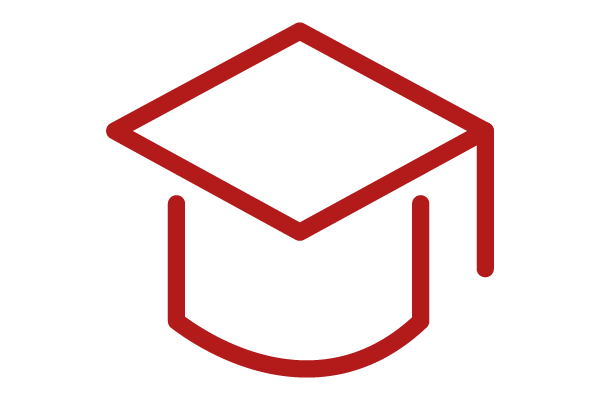
Degree Awarded
MBA from Cornell University
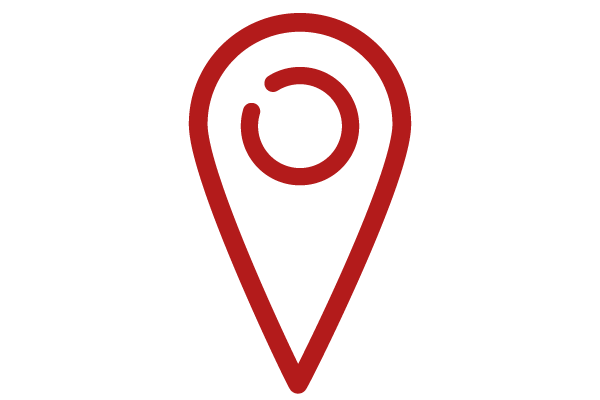
Program Location
Ithaca, NY (with course options available in New York City)

Program Format
Full-time residential

Program Length
EXPLORE THE TWO-YEAR MBA
Johnson Cornell Tech MBA: A One-Year Program
In a data-driven, digital-first marketplace, tech-savvy leaders are in high demand. Whether you’re already in tech and want to boost your business acumen, or you are an executive who wants to hone your tech skills, this accelerated master’s program might be right for you. Designed to be completed in about a year, the STEM-designated Johnson Cornell Tech MBA starts with a foundation in business fundamentals—then focuses on putting that knowledge into action.
New York City
Full-time residential and STEM-designated MBA
LEARN ABOUT THE JOHNSON CORNELL TECH MBA
Johnson Cornell Tech 1+1 MBA
The Johnson Cornell Tech 1+1 MBA provides an opportunity for students to benefit from opportunities in Ithaca and New York City. The 21-month program consists of four semesters and a required summer internship. Students begin as a member of the Johnson School’s Ithaca-based two-year residential MBA program and are in Ithaca for the fall and spring semesters. After a tech-focused summer internship, students transfer to the Cornell Tech campus in New York City and become members of the Johnson Cornell Tech MBA program .
Ithaca, NY, and New York City
DISCOVER THE JOHNSON CORNELL TECH 1+1 MBA

Executive MBA (EMBA) Programs
If you’re looking for a master’s degree in management that aligns with your career goals and your busy schedule, look no further than an executive MBA. Designed for working professionals, the Johnson School’s innovative EMBA programs allow you to earn a graduate degree without putting your career on hold. In fact, you’ll see your investment in yourself pay off in real time as you apply what you learn as you learn.
Cornell Executive MBA Americas
It’s an Ivy League education that comes to you. This 17-month program allows you to learn alongside international classmates from one of 20 locations across North and South America—or online through synchronous instruction. The Johnson School’s EMBA Americas program pioneered the concept of distributed classrooms and remains the gold standard of distance education.
Degrees Awarded
An MBA from Cornell University and an MBA from Queen’s University in Kingston, Ontario, Canada
Select from cities across the Americas or online
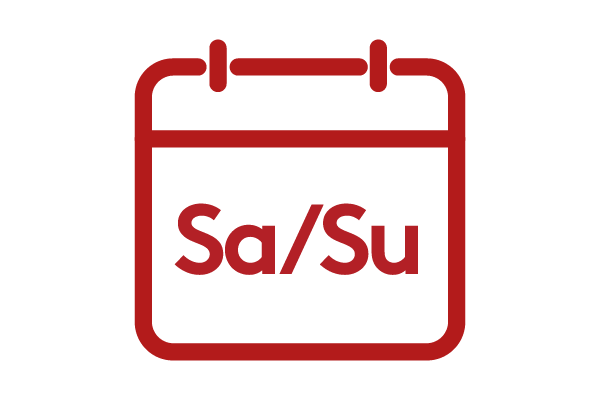
Classes every other Saturday and Sunday with four residential sessions
17 months of classes starting in late June, followed by a capstone project
EXPLORE EMBA AMERICAS
Cornell Executive MBA Metro NY
Built with tri-state business executives in mind, Cornell’s Executive MBA Metro NY allows you to earn an Ivy League graduate degree on alternating weekends at our Roosevelt Island campus while continuing to work full-time. Based in one of the world’s largest and most diverse cities, this part-time MBA program offers unparalleled access to networking and immersive learning opportunities.
An MBA from Cornell University
Tata Innovation Center on the Cornell Tech campus on Roosevelt Island in New York City
Classes every other weekend (Saturday and half-day Sunday); four weeklong residential sessions in Ithaca, NY; and one weeklong international immersion
22 months; classes begin in July
LEARN ABOUT EMBA METRO NY
Cornell Executive MBA/MS in Healthcare Leadership
Whether you’re a business executive, physician, or medical industry professional, our dual executive MBA/master’s program in healthcare leadership will prepare you to lead change and drive innovation in a rapidly expanding and evolving sector. Offered in collaboration with the Weill Cornell Graduate School of Medical Sciences , this program can be completed while you continue to work full-time.
An MBA and an MS from Cornell University
Roosevelt Island, New York City
Classes every other Saturday and half-day Sunday with residential sessions in Ithaca, NY, and New York City
22 months of classes starting in July
EXPLORE EMBA/MS IN HEALTHCARE LEADERSHIP
Cornell-Tsinghua Finance MBA
The only management master’s degree of its kind, the Cornell-Tsinghua Finance MBA is delivered in English and Chinese (Mandarin). Based in Beijing, this part-time international finance program accommodates even the most demanding schedules. Over the course of 22 months, you’ll complete your MBA courses on the weekends, allowing you to balance life, work, and school. You’ll learn from leading finance experts and study alongside other high-quality candidates.
Cornell MBA/Tsinghua MBA
Classes on the weekends with residential sessions in Beijing and Ithaca, NY
LEARN ABOUT CORNELL-TSINGHUA FINANCE MBA

Specialized Management Master’s Degrees
The Johnson School offers several specialized management graduate programs that can expand, advance, and enrich your career, including STEM-designated and accounting-focused master’s degrees.
Master of Science in Business Analytics (MSBA)
As organizations increasingly rely on quality data to drive decision-making, demand has grown for business intelligence professionals. The Johnson School’s STEM-designated MSBA program not only trains you to understand data in the context of business, but also prepares you to translate findings into meaningful, actionable insights. These sought-after skills lead to lucrative data science careers in a wide range of industries including finance, marketing, consulting, manufacturing, HR, healthcare, and tech.
Online with two weeklong residencies

Part-time, STEM-designated
EXPLORE THE MSBA PROGRAM
Master of Professional Studies (MPS) in Management
Ideal for students with an undergraduate degree in an area other than business, this flexible, 10-month management graduate program can be tailored to meet your career goals. With a rigorous business core, specialized electives, and practical learning experiences, you’ll be prepared for whatever professional endeavors come your way next.
Full-time residential and STEM-designated
EXPLORE THE MPS IN MANAGEMENT PROGRAM
MPS in Management – Accounting Specialization
Prepare for the CPA exam—and accounting leadership roles—with our STEM-designated MPS in Management – Accounting Specialization degree. Whether preparing for your first job or looking to expand your accounting knowledge and credentials, this innovative, accelerated program will prime you for high-level roles in industries like public accounting, financial services, real estate, or consulting.
MORE ABOUT THE MPS IN MANAGEMENT – ACCOUNTING SPECIALIZATION
Additional Johnson Graduate Business Programs
Research-minded professionals interested in exploring management science at a deeper level may be interested in a doctoral-level program. Johnson students can also expand their opportunities by combining a management master’s degree with another Cornell graduate program.

PhD in Management
Our fully funded, completely residential PhD in management is designed for ambitious students and business professionals interested in pursuing a career in university teaching and research. Based at the Johnson School in Ithaca, NY, this doctoral program combines Ivy League rigor and real-world relevance to prepare you for a successful career in academia or consulting.

Dual-Degree Programs
A solid business acumen is helpful—if not essential—to executive-level roles in any industry. Earning an MBA in tandem with another graduate degree makes for a powerful combination. Offered in conjunction with other prestigious schools at Cornell, these three combinations have a solid record of success for our alumni:
- MBA + Juris Doctor (JD)
- MBA + Master of Industrial and Labor Relations (MILA)
- MBA + Master of Public Administration (MPA)
With hundreds of academic disciplines across Cornell University, additional dual-degree options abound. We also offer a unique fifth-year MBA program that allows exceptional Cornell undergraduates to complement their major area of study with a master’s degree.

Executive Education for Individuals and Organizations
The world is changing rapidly. No matter where you are in your career, we’ll help you keep up—and prepare for what’s next. Among our dozens of online and in-person executive education programs, you’ll find courses in fintech, servant leadership, persuasive communication, data privacy strategy, product marketing, and leading remote teams. We also offer customizable training and professional development programs for teams and organizations.
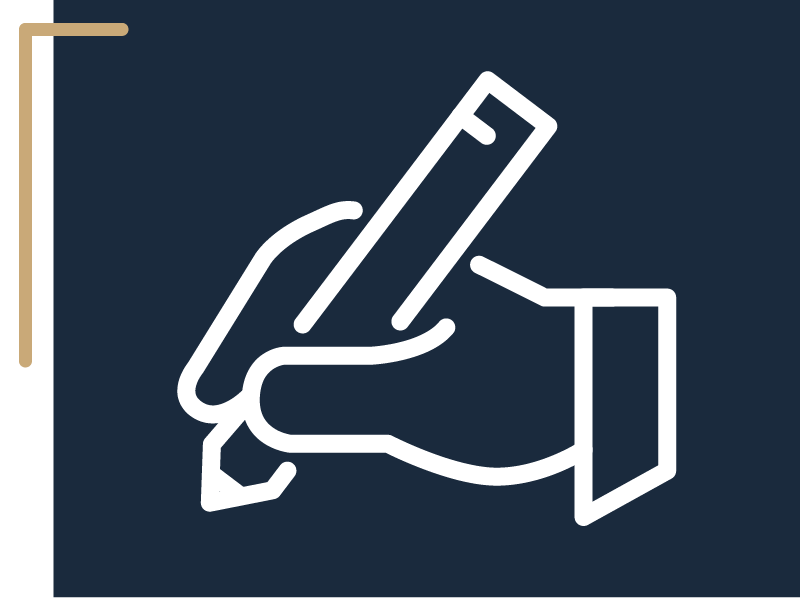
Request Information: Learn More about Johnson’s Graduate Programs
Interested in learning more about one or more of the Johnson School’s executive MBA, master’s programs in management, business-related PhD, or dual-degree programs? Our admissions team is available to answer your questions and support you through the application process.
The Cornell Community: Life at the Johnson School
With the intense academics you’d expect from an Ivy League university and the close-knit atmosphere of a smaller college, the Johnson School is consistently ranked among the top graduate schools for business. In fact, the Cornell Johnson Graduate School of Management was rated No. 1 for Best Campus Environment in the Princeton Review’s 2023 B-School rankings. Even if you’re studying in one of our hybrid programs, you’ll get some quality on-campus time. And when you’re learning from afar, our high-caliber learning experience will keep you feeling connected to the Cornell community.

Why Johnson?
When you choose the Johnson School, you join a community of ambitious learners, thinkers, and doers. Our management master’s degrees and other graduate business programs offer an innovative, immersive curriculum full of unique learning experiences. And our academic programs are designed with input from trusted industry partners and our expansive alumni network.

Our Campus and Community
While our management programs vary in length and format, they all include a residential component. Whether you’re in Ithaca, NY, for a few weeks or a few years, you’ll experience academic life on one of the most iconic college campuses in the United States. Our learning spaces include the Gothic-style Sage Hall and the sleek and modern Breazzano Family Center for Business Education.

Our Expertise
With hundreds of accomplished faculty members and more than 15,000 alumni making their mark across the globe, our Cornellians are innovating and leading the way in nearly every sector. The Cornell SC Johnson College of Business is especially known for its deep industry expertise in consulting, technology, entrepreneurship, and investment banking.
Next Steps: Where Will Johnson Take You?
Ready to take your career to the next level with one of the Johnson School’s management graduate programs? We encourage you to start your application!

Community Blog
Keep up-to-date on postgraduate related issues with our quick reads written by students, postdocs, professors and industry leaders.
The MBA vs PhD Debate

- By Grace M.
- August 14, 2020

If there’s one question that seems to get business university professors flinching at, it’s the all-to-often “ what’s better – an MBA or a PhD? ”
The reason for this is clear – asking such a question seems to suggest that the result of obtaining an MBA or PhD is the same. This couldn’t be any further from the truth.
Let us first quickly break down what an MBA and a PhD is.
MBA is short for Master of Business Administration , while PhD is short for Doctor of Philosophy . Just from the first word of both types of degrees, we can already see that there’s an obvious difference between the two, but let’s proceed.
In terms of the required time commitment, an MBA will usually take two years to complete full time. On the other hand, getting a PhD can take four years (unless you decide to undertake it part time or enrol into an accelerated online PhD degree programme). So if time is your primary concern, then an MBA would be the obvious path for you.
As an MBA student, you’ll find that much of the learning curriculum is closely related to a professional environment. In fact, this is why some universities mandate at least one year of actual work experience as an entry requirement. As a result of the masters degree being so closely related to business in practice, an MBA student will usually research a broad range of subjects. Each of these subjects would focus on a unique business aspect such as accounting, consulting, economics, marketing, finance, leadership, management, ethics and trading.
On the other hand, a Business PhD student will only focus on one subject and do so in much greater detail. On top of this, the PhD student will usually also be expected to support lecturers with teaching classes and leading tutorial sessions.
The reason for this difference is because a doctorate is an advanced degree which aims to make you an expert in a specialised field. Because of this, a PhD is regarded as the higher professional qualification of the two.
MBA vs PhD Entrance Requirements
Due to the amount of funding available, a high number of applicants and a few available positions, the competition for entry into MBA and PhD programmes can be very high.
The specific requirements depend on the country you intend to study in; however, most MBA programmes require you to sit Graduate Management Test ( GMAT ) or Graduate Record Examinations ( GRE ). Regardless of whether you need to undertake a pre-qualification exam or not, most universities prioritise applicants who already have a level of professional experience.
The reverse is true for PhD programmes. For PhDs, you will require a relevant undergraduate or postgraduate degree (usually with a 2:1 or 1st), but you will not be expected to sit any pre-entrance exams nor will you be expected to have working experience. As a result, most students who do a business PhD are younger than those who do an MBA.
Earning your MBA or Doctorate Online

As if the MBA or PhD debate wasn’t enough, the online versions of these degrees are starting to get thrown into the comparisons. With the fast-developing rate of the internet and a general trend towards online global connectivity, higher education is experiencing a significant transformation.
Not only is it possible to get a doctorate online , MBA programmes and Masters in Project Management are also much more widely available online from top-ranking universities compared to several years ago.
While online learning may not be for everyone, many adult students, including myself, favour online degrees due to the flexibility they provide to on-campus or distant learning programmes. As someone who used to dedicate several hours a night on a university campus in a neighbouring area, take it from me, being able to study from your home office isn’t only easier, it’s much less stressful.
MBA vs PhD Career Options
So what gives a better return on investment in terms of career options, an MBA or a PhD?
The MBA is a specialised business degree, and as such, anyone who holds it is a valuable asset for any business. Industries are all about using employee abilities to the organisation’s benefit, and an MBA isn’t something an organisation should or will ignore.
Having a Masters in Business Administration is usually associated with greater career prospects. This is reflected in the speed that an MBA degree holder can climb the corporate ranks compared to an individual who doesn’t hold the specialised degree. Not only can they progress faster, but MBA holders typically also achieve higher positions during their career. This can include highly sought after positions such as associate directors and senior executives (assuming the student is ambitious and dedicated enough). Another benefit of getting an MBA is surrounding earning potential. It’s not unusual for those with an MBA from the London Business School, Oxford University or Imperial College London to receive starting salaries in excess of £50,000 a year .
In comparison, most business PhD holders won’t follow the same path as their MBA colleagues. Instead, most PhD graduates will enter into either a research or academic career. Because of this significant difference in the typical career path, which of the two types of degrees is better suited for you will depend on exactly what it is you want to do after completing your studies.
Finding a PhD has never been this easy – search for a PhD by keyword, location or academic area of interest.
PhD after MBA
Hopefully, it should be clear by now that an MBA and a PhD are two very different degrees, and because of that, it should also start to become clearer regarding which degree is for you.
If this isn’t the case, it may be useful to know that some business students, after completing their undergraduate degree, obtain an MBA and then move onto a PhD. This actually makes a lot of sense since the two forms of professional qualifications cover different stages of a student’s learning, and on that basis, there’s no reason why you couldn’t do both.
In fact, a few universities offer programmes that combine both degrees as a PhD-MBA dual degree. They are better known as PhD-MBA Integrated Degrees (or PhD-MBA Joint Degrees in US Graduate Schools) and can be the perfect option for anyone who wants to get the best of both qualifications. You don’t necessarily need an MBA for PhD eligibility, but they can prove beneficial as the transition from MBA to PhD will usually be less arduous than from Bachelors to PhD.
So what’s Better, a PhD or MBA?

The final answer depends on you. If you’re an individual who enjoys going up against others or the market, then an MBA will probably be the right option for you. On the other hand, if you prefer the realms of researching business theories, challenging yourself mentally and being able to pass on knowledge to others, then a PhD could be the better option. If both options sound interesting to you, then you may find a PhD-MBA dual degree of interest.
In the end, then, the question isn’t about whether an MBA is better than a PhD, but which one is personally better for you.

This post explains the difference between the journal paper status of In Review and Under Review.

Do you need to have published papers to do a PhD? The simple answer is no but it could benefit your application if you can.

Find out the differences between a Literature Review and an Annotated Bibliography, whey they should be used and how to write them.
Join thousands of other students and stay up to date with the latest PhD programmes, funding opportunities and advice.

Browse PhDs Now

Reference management software solutions offer a powerful way for you to track and manage your academic references. Read our blog post to learn more about what they are and how to use them.

Self-plagiarism is when you try and pass off work that you’ve previously done as something that is completely new.
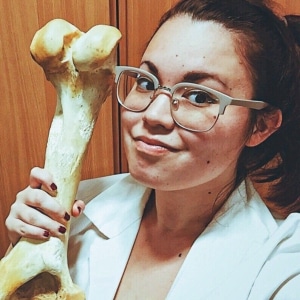
Alex is a PhD student at the University of Bradford researching ritual and funerary rites in later prehistoric Scotland: an analysis of faunal assemblages from the Covesea Caves.

Dr Patel gained his PhD in 2011 from Aston University, researching risk factors & systemic biomarkers for Type II diabetes & cardiovascular disease. He is currently a business director at a large global pharmaceutical.
Join Thousands of Students
Find the Best Business Schools
A Master of Business Administration can help those looking to pivot careers or satisfy a qualification for an advanced position. Students will learn practical skills in leadership, management and communication along with more specialized coursework. For those needing reassurance in their leadership, confidence is known to be a byproduct of the degree.
For full rankings, GMAT scores and employment data, sign up for the U.S. News Business School Compass.
- 2024 Best Business Schools
- # 1 Stanford University (tie) Stanford, CA
- # 1 University of Pennsylvania (Wharton) (tie) Philadelphia, PA
- # 3 Northwestern University (Kellogg) (tie) Evanston, IL
- # 3 University of Chicago (Booth) (tie) Chicago, IL

- 2024 Part-time MBA
- # 1 University of Chicago (Booth) Chicago, IL
- # 2 University of California, Berkeley (Haas) Berkeley, CA
- # 3 Northwestern University (Kellogg) Evanston, IL

Search Business Schools
Earning an MBA or another master's degree in business can help prospective students advance their careers in the public and private sectors.
MBA Programs, Specialties and Additional Rankings
Choosing an MBA specialty may help you stand out in a stack of resumes. These concentrations will dictate which classes you take, the connections you will make and your next career move. Think about the long term and how, for example, a specialty in entrepreneurship could take you into venture capital or an international speciality could take you abroad.
MBA Programs
Both an executive MBA and part-time MBA allow you to continue working while you’re enrolled in school. See how the two differ in coursework and focus by exploring the rankings below.
- Executive MBA
MBA Specialties
See which schools have ideal programs for each of the specialties below. The best school for an MBA in nonprofit management may not be the same as for an MBA in information systems.
- Business Analytics
- Entrepreneurship
- Information Systems
- International
- Production / Operations
- Project Management
- Real Estate
- Supply Chain / Logistics
Best Online Programs
Explore business schools that offer the convenience of online programs.
- Online MBA & Graduate Business
Additional Business School Resources
Check out some more tools that break down the student makeup of these business schools.
- B-Schools: Most International Students
- B-Schools: Most Minority Students
- B-Schools: Most Female Students
- A-Z List of Business Schools
How to Prepare for and Apply to Business School
How long is business school, what do you learn in business school and why enroll, is business school worth it, how much does business school cost, when should i apply to business school, considering business school.
Sign up for a free U.S. News account to receive expert advice on topics like the value of an MBA, GMAT prep and admissions essays.
Business School Advice
Applying to Business School

About the GMAT

Paying for Business School

Best Jobs for MBAs

More About Business Schools
Get accepted to multiple top b-schools.
Maximize every opportunity to emphasize the unique contributions you can bring to an MBA class.
Anayat Durrani May 16, 2024

An MBA and Management Consulting
An MBA is a major advantage when competing for management consulting jobs, experts say.
Sammy Allen May 2, 2024

Questions Women MBA Hopefuls Should Ask
Ask about the campus community, classroom culture and academic leadership as they relate to women.
Haley Bartel April 12, 2024

MBA Programs That Lead to Good Jobs
The average salary and bonus for 2023 MBA graduates was highest at Stanford University, per U.S. News data.
Ilana Kowarski and Cole Claybourn April 10, 2024

B-Schools With Racial Diversity
Underrepresented racial minorities make up an average of 54% of the student populations at these B-schools.
Sarah Wood April 10, 2024

5 Hot Jobs for MBA Graduates
The job market is competitive for MBA graduates, so experts emphasize the importance of networking.
Sarah Wood April 9, 2024

U.S. News Ranks Best Graduate Schools
Find the top-ranked graduate schools in business, education, law, nursing and other fields.

MBA Scholarships
There are many opportunities for scholarships, fellowships and other sources of money that you don't have to repay.
Sammy Allen April 4, 2024

How to Decide if an MBA Is Worth it
Understand your financial and career goals before enrolling in an MBA program.
Sarah Wood March 27, 2024

4 Surprising MBA Application Mistakes
From not being true to yourself to applying before you're ready, these issues go beyond typos on application materials.
Andrew Warner March 18, 2024

MBA vs PhD in Business
Key Takeaways
- An MBA is well-suited for students who are interested in practical work experience, while PhD candidates focus on those interested in research primarily.
- If you thrive in practical business settings, seek rapid career advancement, and value hands-on experience, pursuing an MBA degree may be a good choice.
- iI you’re passionate about research, academic pursuits, specialized expertise, and making scholarly contributions, pursuing a PhD in business may align better with your goals.
Students often face the dilemma of whether to pursue a PhD or an MBA. Each program offers unique benefits and challenges. In this article, we explore the similarities and differences between an MBA vs PhD in Business, and share a comprehensive overview to help you make your decision with ease.

Featured Programs
Mba vs. phd in business: a general overview, what is an mba.
Master of Business Administration (MBA) is an advanced degree in business administration available to students at the graduate level. Earning an MBA gives you a solid grounding in all things relevant to business.
Most people who pursue an MBA do so to prepare themselves for leadership roles. Individuals holding an MBA can have any of the following designations:
- Vice President of Finance
- Accounting Manager
- Product Manager
- Chief Financial Officer
- Human Resources Manager
- Financial Analyst
- Policy Analyst
What is A PhD?
PhD is the highest level of academic achievement recognized. It is a research degree at the doctorate level and can be earned in many fields, including business. The Doctor of Business Administration ( DBA ) is one of the most popular options among those seeking the highest degree in business.
Most people who get a doctorate in business do it because they are really interested in teaching at a university or because they want to study a particular subject in depth. Designations held by individuals holding a doctorate in business include:
- Financial manager
- Management analyst
- Chief executive officer
- Sales manager
- Market research analyst
Comparing MBA and PhD in Business
Many students face the challenge of choosing between an MBA or a PhD in business. Wondering which of these programs would be the right fit for you? Comparing these programs can help you get the answer you’re looking for.
Similarities
Competitive admissions.
Admission to MBA and PhD programs can be highly competitive due to factors like limited funding, a high number of applicants, and limited available slots. This competitiveness underscores the importance of presenting a strong application that highlights academic achievements, relevant experience, and MBA career aspirations .
Enrollment Requirements
Candidates typically need a bachelor’s degree to apply for MBA programs, although a background in business can bolster their application. PhD programs also typically require a bachelor’s or master’s degree in the relevant field.
This prerequisite makes sure that applicants have a foundational understanding of academic principles and are prepared for graduate-level coursework.
Standardized Tests
Prerequisites for MBA programs often include standardized tests such as the Graduate Management Admission Test (GMAT) or the Graduate Record Examinations (GRE). Similarly, some PhD programs may require candidates to take the GRE too.
These tests assess skills in areas like analytical writing, quantitative reasoning, and verbal reasoning, helping admissions committees evaluate applicants’ readiness for advanced academic studies.

Differences
Work experience.
MBA programs often value applicants with relevant work experience, especially for executive or part-time MBA programs. Professional experience can enhance classroom discussions, bring real-world perspectives to coursework, and contribute to a diverse learning environment.
In contrast, while work experience can be beneficial for PhD applicants, it is generally not a mandatory requirement for admission.
Curriculum Focus
The subjects covered in an MBA program compared to a PhD program are what sets them apart. MBA programs typically provide a comprehensive understanding of business practices, including finance, marketing, operations, and strategy. The curriculum emphasizes practical skills, leadership development, and decision-making in business contexts.
In contrast, PhD programs prioritize research skills, critical thinking, and academic contributions to a specific field of study. Doctoral students dive deep into a chosen area of research, conducting original investigations and contributing new knowledge to their discipline.
For instance, one student might choose to learn about marketing and how it works for small businesses. Instead of trying to be an expert on a bunch of different things, you will focus on one specific area of business and learn about its ins and outs.
Degree Duration
The time commitment required to complete an MBA degree can vary from one institution to another. While there are MBA programs that can be completed in 1-year , two years is the typical duration of a full-time MBA program . If students enroll full-time in an accelerated MBA program , they can finish the degree in eleven to sixteen months.
It could take three to six years to finish a part-time MBA degree. Part-time executive MBA programs typically have a duration of eighteen and twenty-four months.
Generally, it takes students four to six years to finish a PhD program. However, for some, it can take as long as eight years. The duration of the program might differ greatly from one student to another and from one curriculum design to another.
Distinguishing Factors
Besides the differences mentioned above, there are some major distinguishing factors between an MBA and a PhD in business. Going through them will further help you evaluate the right choice for yourself.
Networking Opportunities
MBA programs offer a diverse and dynamic networking environment, bringing together professionals from various industries and backgrounds. Students in MBA programs can leverage these networking opportunities to build professional connections, exchange ideas, and access career development resources.
On the other hand, a doctorate in business offers very few opportunities for peer coordination, as the focus is primarily on individual research and scholarly pursuits.
Research vs. Practical Experience
A fundamental distinction between MBA and PhD programs is their emphasis on research versus practical experience. Completing a thesis is a necessary requirement for graduation for most master’s degree programs. While some MBA programs emphasize theoretical understanding and research, others prioritize practical experience.
In contrast, doctoral students undergo rigorous testing to demonstrate their expertise. These tests include candidacy and comprehensive exams. Additionally, a dissertation, a detailed exploration and analysis of a specific subject or research area, is mandatory for earning a PhD.
Doctoral candidates carefully select a thesis topic, conduct extensive research, and present their findings. The culmination of their doctoral journey involves defending their dissertation before an advisory committee, showcasing their mastery of the subject and research skills.
Learning Styles
Choosing between an MBA and a PhD in business involves understanding their distinct structures and learning styles. MBA programs follow a structured path with core courses and specialized tracks, emphasizing practical projects and teamwork in business.
On the other hand, PhD programs offer a more individualistic journey, focusing on research and personal exploration within the field.
Both attract students from diverse backgrounds, with MBA programs often catering to working professionals through flexible schedules.

When can an MBA in business be useful?
So far you’ve learned that even though they serve similar objectives, MBA and PhD are different. Below is a list of plausible ways an MBA can be useful:
- Career Advancement: An MBA benefits professionals seeking rapid career progression within corporate environments. It equips them with a comprehensive understanding of various business domains, leadership skills, and strategic decision-making capabilities.
- Leadership Roles: An MBA can benefit individuals aiming for leadership positions such as Vice President of Finance, Chief Financial Officer, or Human Resources Manager. The program hones their managerial and organizational skills, preparing them to lead teams and drive business growth.
- Industry Transition: MBA programs often attract professionals looking to transition into new industries or roles. The diverse curriculum and networking opportunities MBA programs offer facilitate this transition by providing insights into different sectors and fostering connections with industry experts.
- Entrepreneurship: Many MBA graduates venture into entrepreneurship , leveraging their business acumen and acquired skills to start and manage their own businesses. The program provides valuable knowledge in areas like marketing, finance, and operations, which are important for entrepreneurial success.
- Global Opportunities: With globalization shaping modern business landscapes, an MBA focusing on international business can be particularly useful for professionals seeking global career opportunities. It equips them with cross-cultural management skills and an understanding of international trade dynamics.
When can a PhD in business be useful?
A Ph.D. in business is a prestigious and advanced degree that opens doors to a wide range of impactful career paths. Beyond its academic significance, this degree equips individuals with many other skills, making them invaluable assets in various professional domains.
Let’s see where a PhD in Business can be particularly useful.
- Academic Careers: One of the primary paths for PhD graduates in business is academia. They can pursue careers as professors or researchers in universities, contributing to developing knowledge in their field and mentoring future business leaders.
- Research Excellence: PhD programs emphasize rigorous research methodologies and critical thinking. Individuals interested in conducting in-depth research on specific business topics, publishing scholarly articles, and advancing the theoretical foundations of business disciplines find PhD programs highly rewarding.
- Specialized Roles: Some specialized business roles, such as Chief Economist, require a deep understanding of economic theories and their practical applications. A PhD in business focusing on economics or related fields can be instrumental in securing such positions.
- Consulting and Advisory Roles: PhD holders in business often excel in consulting and advisory roles, offering strategic insights, data-driven recommendations, and innovative solutions to businesses and organizations.
- Leadership in Research Institutions: PhD graduates can lead research institutions , think tanks, or policy development organizations. Their expertise and research acumen contribute to evidence-based decision-making and the advancement of industry practices.

Which is better — An MBA or a PhD in business?
The decision between an MBA and a PhD in business ultimately depends on your career aspirations, interests, and desired impact. If you thrive in practical business settings, seek rapid career advancement, and value hands-on experience, an MBA may be better suited.
On the other hand, if you’re passionate about research, academic pursuits, specialized expertise, and making scholarly contributions, a PhD in business may align better with your goals. It’s important to evaluate your priorities, long-term objectives, and preferred learning and work environments when making this decision.
3 Tips for Choosing Between an MBA and a PhD
Making the choice between the two programs is going to be a tough decision and you’ll need to get all the help you can. So, we’re sharing some tips that can help you assess your priorities, interests, and career trajectory.
Consider these tips when you’re trying to figure out if earning a doctorate will benefit you more or an MBA.
Consult a Professional Guidance Counselor
Consult a career advisor if you are confused about which degree will serve your goals best. They are a great resource for learning about the typical qualifications for your dream job.
You can learn about the requirements of different MBA and PhD programs and assess whether they are a good fit for you.
You can find independent career counselors or take advantage of the free services offered by career guidance counselors at educational institutions.
Find out Each Program’s Commitments
Consider the time and money needed for each program to make sure the one you choose is a beneficial investment for you in the long run. One way to do this is by weighing the time and money spent on the program against the potential gain in income.
Consider Your Preferred Learning Style
Consider your learning style before committing to a degree program since some may place a greater emphasis on certain approaches than others.
Courses that primarily include group work are common in graduate degree programs. In a PhD program, you can be expected to devote the majority of your time to extensive solo research.
Related Questions
Is acquiring a phd beneficial.
A doctorate in business shows that you are very knowledgeable and skilled in your field. It opens doors to rewarding professions in the public and private sectors, such as consulting, investment banking, and others.
Which MBA is most difficult?
One of the most challenging MBA specializations is operations management.
Is earning a PhD stressful?
Managing a personal life and academics and developing new research can be challenging. Generally, PhD students are known to experience stress and mental health problems along the way.
A study on PhD failure rate concludes that 19.5% of PhD candidates do not pass their final exam, and 16.2% drop out of the program before completion. However, overall 85% of PhD applicants are able to finish the program and earn their degree.
If you thrive on competition and practical challenges, an MBA might be the right choice for you. Alternatively, if you enjoy exploring theoretical frameworks, intellectual growth, and mentorship, a PhD could be ideal. If you’re someone who enjoys both aspects, you could consider going for a dual PhD.
About Stanford GSB
- The Leadership
- Dean’s Updates
- School News & History
- Commencement
- Business, Government & Society
- Centers & Institutes
- Center for Entrepreneurial Studies
- Center for Social Innovation
- Stanford Seed
About the Experience
- Learning at Stanford GSB
- Experiential Learning
- Guest Speakers
- Entrepreneurship
- Social Innovation
- Communication
- Life at Stanford GSB
- Collaborative Environment
- Activities & Organizations
- Student Services
- Housing Options
- International Students
Full-Time Degree Programs
- Why Stanford MBA
- Academic Experience
- Financial Aid
- Why Stanford MSx
Research Fellows Program
- See All Programs
Non-Degree & Certificate Programs
- Executive Education
- Stanford Executive Program
- Programs for Organizations
- The Difference
- Online Programs
- Stanford LEAD
- Seed Transformation Program
- Aspire Program
- Seed Spark Program
- Faculty Profiles
- Academic Areas
- Awards & Honors
- Conferences
Faculty Research
- Publications
- Working Papers
- Case Studies
Research Hub
- Research Labs & Initiatives
- Business Library
- Data, Analytics & Research Computing
- Behavioral Lab
Research Labs
- Cities, Housing & Society Lab
- Golub Capital Social Impact Lab
Research Initiatives
- Corporate Governance Research Initiative
- Corporations and Society Initiative
- Policy and Innovation Initiative
- Rapid Decarbonization Initiative
- Stanford Latino Entrepreneurship Initiative
- Value Chain Innovation Initiative
- Venture Capital Initiative
- Career & Success
- Climate & Sustainability
- Corporate Governance
- Culture & Society
- Finance & Investing
- Government & Politics
- Leadership & Management
- Markets & Trade
- Operations & Logistics
- Opportunity & Access
- Organizational Behavior
- Political Economy
- Social Impact
- Technology & AI
- Opinion & Analysis
- Email Newsletter
Welcome, Alumni
- Communities
- Digital Communities & Tools
- Regional Chapters
- Women’s Programs
- Identity Chapters
- Find Your Reunion
- Career Resources
- Job Search Resources
- Career & Life Transitions
- Programs & Services
- Career Video Library
- Alumni Education
- Research Resources
- Volunteering
- Alumni News
- Class Notes
- Alumni Voices
- Contact Alumni Relations
- Upcoming Events

Admission Events & Information Sessions
- MBA Program
- MSx Program
- PhD Program
- Alumni Events
- All Other Events
- Requirements
- Requirements: Behavioral
- Requirements: Quantitative
- Requirements: Macro
- Requirements: Micro
- Annual Evaluations
- Field Examination
- Research Activities
- Research Papers
- Dissertation
- Oral Examination
- Current Students
- Entering Class Profile
- Education & CV
- GMAT & GRE
- International Applicants
- Statement of Purpose
- Letters of Recommendation
- Reapplicants
- Application Fee Waiver
- Deadline & Decisions
- Job Market Candidates
- Academic Placements
- Stay in Touch
- Fields of Study
- Student Life

Our faculty members are uncompromisingly committed to student success

Students pursue an intensely focused, highly energized academic experience in their chosen discipline

Recognized experts in their fields, our faculty continually publish groundbreaking research

Our collaborative culture enables students to support one another, and most students live on campus

Learn more about our application materials and what we look for in a candidate

Our graduates pursue tenure-track academic placements at top institutions around the world
Stanford GSB PhD Program
Discover a focus and intensity greater than you may have thought possible. As a PhD student at Stanford Graduate School of Business, you will be inspired and challenged to explore novel ideas and complex questions.
Fall 2024 applications are now closed. Applications for Fall 2025 will be available in September 2024.

Become an Outstanding Scholar
Our PhD Program is designed to develop outstanding scholars for careers in research and teaching at leading academic institutions throughout the world. You will embark on a challenging and meaningful experience, focusing your academic study in one of seven distinct fields within the PhD degree program.
Is a PhD Right for You?
Strong PhD candidates are full of ideas and curiosity, with a passion and aptitude for research. If you’re prepared to embark on a rigorous career in research and develop your full potential, we invite you to explore the possibilities of a PhD in business. Admitted students receive full fellowships for their doctoral studies.
Faculty Publications
Financial inclusion, economic development, and inequality: evidence from brazil, boeing 737 max, democracy corrupted: apex corruption and the erosion of democratic values, phd student voices, school news, stanford economist guido imbens wins nobel in economic sciences, susan athey named president of american economic association, teaching through a pandemic: students recognize two faculty members for their efforts, diversifying the pool of phd students will require systemic change.
Gain valuable research experience and training in a two-year, pre-doctoral opportunity at Stanford University.
- Priorities for the GSB's Future
- See the Current DEI Report
- Supporting Data
- Research & Insights
- Share Your Thoughts
- Search Fund Primer
- Teaching & Curriculum
- Affiliated Faculty
- Faculty Advisors
- Louis W. Foster Resource Center
- Defining Social Innovation
- Impact Compass
- Global Health Innovation Insights
- Faculty Affiliates
- Student Awards & Certificates
- Changemakers
- Dean Jonathan Levin
- Dean Garth Saloner
- Dean Robert Joss
- Dean Michael Spence
- Dean Robert Jaedicke
- Dean Rene McPherson
- Dean Arjay Miller
- Dean Ernest Arbuckle
- Dean Jacob Hugh Jackson
- Dean Willard Hotchkiss
- Faculty in Memoriam
- Stanford GSB Firsts
- Certificate & Award Recipients
- Teaching Approach
- Analysis and Measurement of Impact
- The Corporate Entrepreneur: Startup in a Grown-Up Enterprise
- Data-Driven Impact
- Designing Experiments for Impact
- Digital Business Transformation
- The Founder’s Right Hand
- Marketing for Measurable Change
- Product Management
- Public Policy Lab: Financial Challenges Facing US Cities
- Public Policy Lab: Homelessness in California
- Lab Features
- Curricular Integration
- View From The Top
- Formation of New Ventures
- Managing Growing Enterprises
- Startup Garage
- Explore Beyond the Classroom
- Stanford Venture Studio
- Summer Program
- Workshops & Events
- The Five Lenses of Entrepreneurship
- Leadership Labs
- Executive Challenge
- Arbuckle Leadership Fellows Program
- Selection Process
- Training Schedule
- Time Commitment
- Learning Expectations
- Post-Training Opportunities
- Who Should Apply
- Introductory T-Groups
- Leadership for Society Program
- Certificate
- 2023 Awardees
- 2022 Awardees
- 2021 Awardees
- 2020 Awardees
- 2019 Awardees
- 2018 Awardees
- Social Management Immersion Fund
- Stanford Impact Founder Fellowships and Prizes
- Stanford Impact Leader Prizes
- Social Entrepreneurship
- Stanford GSB Impact Fund
- Economic Development
- Energy & Environment
- Stanford GSB Residences
- Environmental Leadership
- Stanford GSB Artwork
- A Closer Look
- California & the Bay Area
- Voices of Stanford GSB
- Business & Beneficial Technology
- Business & Sustainability
- Business & Free Markets
- Business, Government, and Society Forum
- Get Involved
- Second Year
- Global Experiences
- JD/MBA Joint Degree
- MA Education/MBA Joint Degree
- MD/MBA Dual Degree
- MPP/MBA Joint Degree
- MS Computer Science/MBA Joint Degree
- MS Electrical Engineering/MBA Joint Degree
- MS Environment and Resources (E-IPER)/MBA Joint Degree
- Academic Calendar
- Clubs & Activities
- LGBTQ+ Students
- Military Veterans
- Minorities & People of Color
- Partners & Families
- Students with Disabilities
- Student Support
- Residential Life
- Student Voices
- MBA Alumni Voices
- A Week in the Life
- Career Support
- Employment Outcomes
- Cost of Attendance
- Knight-Hennessy Scholars Program
- Yellow Ribbon Program
- BOLD Fellows Fund
- Application Process
- Loan Forgiveness
- Contact the Financial Aid Office
- Evaluation Criteria
- English Language Proficiency
- Personal Information, Activities & Awards
- Professional Experience
- Optional Short Answer Questions
- Application Fee
- Reapplication
- Deferred Enrollment
- Joint & Dual Degrees
- Event Schedule
- Ambassadors
- New & Noteworthy
- Ask a Question
- See Why Stanford MSx
- Is MSx Right for You?
- MSx Stories
- Leadership Development
- Career Advancement
- Career Change
- How You Will Learn
- Admission Events
- Personal Information
- Information for Recommenders
- GMAT, GRE & EA
- English Proficiency Tests
- After You’re Admitted
- Daycare, Schools & Camps
- U.S. Citizens and Permanent Residents
- Faculty Mentors
- Current Fellows
- Standard Track
- Fellowship & Benefits
- Group Enrollment
- Program Formats
- Developing a Program
- Diversity & Inclusion
- Strategic Transformation
- Program Experience
- Contact Client Services
- Campus Experience
- Live Online Experience
- Silicon Valley & Bay Area
- Digital Credentials
- Faculty Spotlights
- Participant Spotlights
- Eligibility
- International Participants
- Stanford Ignite
- Frequently Asked Questions
- Operations, Information & Technology
- Classical Liberalism
- The Eddie Lunch
- Accounting Summer Camp
- Videos, Code & Data
- California Econometrics Conference
- California Quantitative Marketing PhD Conference
- California School Conference
- China India Insights Conference
- Homo economicus, Evolving
- Political Economics (2023–24)
- Scaling Geologic Storage of CO2 (2023–24)
- A Resilient Pacific: Building Connections, Envisioning Solutions
- Adaptation and Innovation
- Changing Climate
- Civil Society
- Climate Impact Summit
- Climate Science
- Corporate Carbon Disclosures
- Earth’s Seafloor
- Environmental Justice
- Operations and Information Technology
- Organizations
- Sustainability Reporting and Control
- Taking the Pulse of the Planet
- Urban Infrastructure
- Watershed Restoration
- Junior Faculty Workshop on Financial Regulation and Banking
- Ken Singleton Celebration
- Marketing Camp
- Quantitative Marketing PhD Alumni Conference
- Presentations
- Theory and Inference in Accounting Research
- Stanford Closer Look Series
- Quick Guides
- Core Concepts
- Journal Articles
- Glossary of Terms
- Faculty & Staff
- Researchers & Students
- Research Approach
- Charitable Giving
- Financial Health
- Government Services
- Workers & Careers
- Short Course
- Adaptive & Iterative Experimentation
- Incentive Design
- Social Sciences & Behavioral Nudges
- Bandit Experiment Application
- Conferences & Events
- Reading Materials
- Energy Entrepreneurship
- Faculty & Affiliates
- SOLE Report
- Responsible Supply Chains
- Current Study Usage
- Pre-Registration Information
- Participate in a Study
- Founding Donors
- Location Information
- Participant Profile
- Network Membership
- Program Impact
- Collaborators
- Entrepreneur Profiles
- Company Spotlights
- Seed Transformation Network
- Responsibilities
- Current Coaches
- How to Apply
- Meet the Consultants
- Meet the Interns
- Intern Profiles
- Collaborate
- Research Library
- News & Insights
- Program Contacts
- Databases & Datasets
- Research Guides
- Consultations
- Research Workshops
- Career Research
- Research Data Services
- Course Reserves
- Course Research Guides
- Material Loan Periods
- Fines & Other Charges
- Document Delivery
- Interlibrary Loan
- Equipment Checkout
- Print & Scan
- MBA & MSx Students
- PhD Students
- Other Stanford Students
- Faculty Assistants
- Research Assistants
- Stanford GSB Alumni
- Telling Our Story
- Staff Directory
- Site Registration
- Alumni Directory
- Alumni Email
- Privacy Settings & My Profile
- Success Stories
- The Story of Circles
- Support Women’s Circles
- Stanford Women on Boards Initiative
- Alumnae Spotlights
- Insights & Research
- Industry & Professional
- Entrepreneurial Commitment Group
- Recent Alumni
- Half-Century Club
- Fall Reunions
- Spring Reunions
- MBA 25th Reunion
- Half-Century Club Reunion
- Faculty Lectures
- Ernest C. Arbuckle Award
- Alison Elliott Exceptional Achievement Award
- ENCORE Award
- Excellence in Leadership Award
- John W. Gardner Volunteer Leadership Award
- Robert K. Jaedicke Faculty Award
- Jack McDonald Military Service Appreciation Award
- Jerry I. Porras Latino Leadership Award
- Tapestry Award
- Student & Alumni Events
- Executive Recruiters
- Interviewing
- Land the Perfect Job with LinkedIn
- Negotiating
- Elevator Pitch
- Email Best Practices
- Resumes & Cover Letters
- Self-Assessment
- Whitney Birdwell Ball
- Margaret Brooks
- Bryn Panee Burkhart
- Margaret Chan
- Ricki Frankel
- Peter Gandolfo
- Cindy W. Greig
- Natalie Guillen
- Carly Janson
- Sloan Klein
- Sherri Appel Lassila
- Stuart Meyer
- Tanisha Parrish
- Virginia Roberson
- Philippe Taieb
- Michael Takagawa
- Terra Winston
- Johanna Wise
- Debbie Wolter
- Rebecca Zucker
- Complimentary Coaching
- Changing Careers
- Work-Life Integration
- Career Breaks
- Flexible Work
- Encore Careers
- Join a Board
- D&B Hoovers
- Data Axle (ReferenceUSA)
- EBSCO Business Source
- Global Newsstream
- Market Share Reporter
- ProQuest One Business
- Student Clubs
- Entrepreneurial Students
- Stanford GSB Trust
- Alumni Community
- How to Volunteer
- Springboard Sessions
- Consulting Projects
- 2020 – 2029
- 2010 – 2019
- 2000 – 2009
- 1990 – 1999
- 1980 – 1989
- 1970 – 1979
- 1960 – 1969
- 1950 – 1959
- 1940 – 1949
- Service Areas
- ACT History
- ACT Awards Celebration
- ACT Governance Structure
- Building Leadership for ACT
- Individual Leadership Positions
- Leadership Role Overview
- Purpose of the ACT Management Board
- Contact ACT
- Business & Nonprofit Communities
- Reunion Volunteers
- Ways to Give
- Fiscal Year Report
- Business School Fund Leadership Council
- Planned Giving Options
- Planned Giving Benefits
- Planned Gifts and Reunions
- Legacy Partners
- Giving News & Stories
- Giving Deadlines
- Development Staff
- Submit Class Notes
- Class Secretaries
- Board of Directors
- Health Care
- Sustainability
- Class Takeaways
- All Else Equal: Making Better Decisions
- If/Then: Business, Leadership, Society
- Grit & Growth
- Think Fast, Talk Smart
- Spring 2022
- Spring 2021
- Autumn 2020
- Summer 2020
- Winter 2020
- In the Media
- For Journalists
- DCI Fellows
- Other Auditors
- Academic Calendar & Deadlines
- Course Materials
- Entrepreneurial Resources
- Campus Drive Grove
- Campus Drive Lawn
- CEMEX Auditorium
- King Community Court
- Seawell Family Boardroom
- Stanford GSB Bowl
- Stanford Investors Common
- Town Square
- Vidalakis Courtyard
- Vidalakis Dining Hall
- Catering Services
- Policies & Guidelines
- Reservations
- Contact Faculty Recruiting
- Lecturer Positions
- Postdoctoral Positions
- Accommodations
- CMC-Managed Interviews
- Recruiter-Managed Interviews
- Virtual Interviews
- Campus & Virtual
- Search for Candidates
- Think Globally
- Recruiting Calendar
- Recruiting Policies
- Full-Time Employment
- Summer Employment
- Entrepreneurial Summer Program
- Global Management Immersion Experience
- Social-Purpose Summer Internships
- Process Overview
- Project Types
- Client Eligibility Criteria
- Client Screening
- ACT Leadership
- Social Innovation & Nonprofit Management Resources
- Develop Your Organization’s Talent
- Centers & Initiatives
- Student Fellowships

- Faculty Resources
- Request More Information
PhD/MBA Program
The Wake Forest University PhD/MBA program is dedicated to training and research at the interface between science andbusiness to unleash the power and potential of technology for the benefit of society.
A large proportion of Ph.D. graduates work in the private sector in positions that use the skills acquired during their graduate training. But in addition to the scholarship and rigor that makes the Ph.D. a world model, there is a need for a broader range of skills for success in a changing employment climate. The Wake Forest University Graduate School of Arts and Sciences, in conjunction with the Schools of Business , has initiated an innovative course of study leading to the PhD/MBA. The Wake Forest PhD/MBA program is the first program of its kind in the nation, and the first to produce students with the joint degree (see testimonials from some of our graduates, below).
The World Can Change at the Intersection of Disciplines
Uniting science and management, the PhD/MBA program is preparing a new generation of leaders for the emerging fields of technology. Our mission is focused, providing education and research training leading to beneficial uses for the rapidly emerging discoveries in the sciences, and preparing students for industry or academic leadership. Multidisciplinary knowledge is indispensable in the development of new products and processes and in the translation of biomedical advances to patients and the global market. As the first graduate program in the nation offering management training with the Ph.D., we are dedicated to capturing the brightest minds and providing them with the scientific and management expertise needed to foster the technology infrastructure of the nation.
An Innovative and Efficient Curriculum
The PhD/MBA program is a synthesis of curricula from the Graduate School and the Evening MBA Program of the Schools of Business, with specialized course work and opportunities for industrial and business internships. The joint program is open to new and current students in all PhD-granting programs across all Wake Forest campuses. Students take from 4-6 years to complete the joint program, depending on the nature of the graduate research undertaken in the home program. The first year of the curriculum will provide students with a core base of knowledge in the core competencies of the home graduate program. At the end of the second year, and before beginning MBA course work, the student must take and pass examinations that will admit him/her to candidacy for the PhD. A student enrolling in the PhD/MBA program would have 5-6 semesters of evening MBA courses added to the graduate degree requirements. Opportunities for industrial projects and internships are possible after ascent to PhD candidacy and during the MBA coursework phase. The PhD and MBA degrees will be awarded simultaneously at the completion of all requirements for both degrees.
Apply Online
Students wishing to enroll in the combined program apply to and meet the respective admissions requirements of the Graduate School of Arts and Sciences and the Schools of Business. Admission to the MBA portion of the program occurs separately after gaining admission to the home graduate program, and after securing appropriate approval from the home program for participation in the joint program. In addition to the general requirements of the Graduate School of Arts and Sciences, the Schools of Business requires completion of the GMAT (General Management Aptitude Test). The Schools of Business will also accept the Graduate Record Exam (GRE) as a replacement for the GMAT for admissions.
Contact Information
Questions regarding admissions: Mr. Kevin Bender Associate Director, Graduate Admissions School of Business (336) 758-3091 [email protected]
General questions: Dr. Dwayne Godwin Associate Dean Graduate School of Arts and Sciences [email protected]
A Small Program with Big Impact
PhD/MBA students completed an economic impact study of new in silico algorithms used in the drug discovery process. This study contributed to a $2 million grant awarded by the US government to develop computer simulation software designed to predict biological and toxicological effects of drugs, which will reduce the failure rate in the drug development process. Pictured from the left are Donald Debethizy, President and CEO of Targacept, Inc., Randy Jacinto, PhD/MBA graduate; Richard Alexander, PhD/MBA graduate; Dwayne W. Godwin, Ph.D., Department of Neurobiology and Anatomy and Director of the PhD/MBA program; Adam Winseck, PhD/MBA graduate; and William S. Caldwell, Ph.D., Vice President of Drug Discovery and Development, Targacept, Inc. Not pictured is Heather Peters, PhD/MBA student who also worked on the project.
For a list of academic programs and contact information please visit:
Academic Programs and Contacts
To see a list of Programs:
- Degree Programs
- Joint Degree and Certificate Programs
- Summer Programs
- Diversity Programs
What the Students Have to Say About the PhD/MBA Program :
“My new job is exactly what I have been looking for. I found that the dual degree is an attractive combination that will allow me to go further, faster.” DR. ADAM WINSECK MEDICAL MARKETING, SANOFI AVENTIS, INC. 2004 NEUROBIOLOGY AND ANATOMY MEDICAL EDUCATION MARKETING
“The fusion of biology and business has provided a unique perspective – like looking at the world from space, it’s easier to see the whole picture. As an aspiring entrepreneur I feel that the skills I learned will amplify my ability to make a difference.” DR. RANDY JACINTO BIORAD, INC. 2004 PHD/MBA GRADUATE MOLECULAR MEDICINE
“Incredible advances can occur where disciplines collide. The PhD/MBA program has given me the tools to pursue a broader career horizon without sacrificing my core scientific interests.” DR. RICHARD ALEXANDER 2004 PHD/MBA GRADUATE PHYSIOLOGY/PHARMACOLOGY
“The PhD/MBA program prepared me for a career, not just a job. Today I am conducting research with a deeper understanding of how my work supports my organization.” DR. HEATHER PETERS PHD/MBA GRADUATE CHEMISTRY
“Drawing from my management and scientific training in equal measure, I’ve enjoyed the increased level of responsibility and respect that has come with achieving the dual degree.” DR. FRANK WELDER PHD/MBA GRADUATE CHEMISTRY MECHNICAL AND QUALITY DIRECTOR MICROBAC LABORATORIES, INC.
- WFU Schools of Business PhD/MBA page
- On-line GMAT practice tests free of charge
- ” WFU Merges Science and Business in Curriculum “ – Article in the Business Journal of the Triad
Smart. Open. Grounded. Inventive. Read our Ideas Made to Matter.
Which program is right for you?

Through intellectual rigor and experiential learning, this full-time, two-year MBA program develops leaders who make a difference in the world.
A rigorous, hands-on program that prepares adaptive problem solvers for premier finance careers.
A 12-month program focused on applying the tools of modern data science, optimization and machine learning to solve real-world business problems.
Earn your MBA and SM in engineering with this transformative two-year program.
Combine an international MBA with a deep dive into management science. A special opportunity for partner and affiliate schools only.
A doctoral program that produces outstanding scholars who are leading in their fields of research.
Bring a business perspective to your technical and quantitative expertise with a bachelor’s degree in management, business analytics, or finance.
A joint program for mid-career professionals that integrates engineering and systems thinking. Earn your master’s degree in engineering and management.
An interdisciplinary program that combines engineering, management, and design, leading to a master’s degree in engineering and management.
Executive Programs
A full-time MBA program for mid-career leaders eager to dedicate one year of discovery for a lifetime of impact.
This 20-month MBA program equips experienced executives to enhance their impact on their organizations and the world.
Non-degree programs for senior executives and high-potential managers.
A non-degree, customizable program for mid-career professionals.
PhD Program
Program overview.
Now Reading 1 of 4
Rigorous, discipline-based research is the hallmark of the MIT Sloan PhD Program. The program is committed to educating scholars who will lead in their fields of research—those with outstanding intellectual skills who will carry forward productive research on the complex organizational, financial, and technological issues that characterize an increasingly competitive and challenging business world.
Start here.
Learn more about the program, how to apply, and find answers to common questions.
Admissions Events
Check out our event schedule, and learn when you can chat with us in person or online.
Start Your Application
Visit this section to find important admissions deadlines, along with a link to our application.
Click here for answers to many of the most frequently asked questions.
PhD studies at MIT Sloan are intense and individual in nature, demanding a great deal of time, initiative, and discipline from every candidate. But the rewards of such rigor are tremendous: MIT Sloan PhD graduates go on to teach and conduct research at the world's most prestigious universities.
PhD Program curriculum at MIT Sloan is organized under the following three academic areas: Behavior & Policy Sciences; Economics, Finance & Accounting; and Management Science. Our nine research groups correspond with one of the academic areas, as noted below.
MIT Sloan PhD Research Groups
Behavioral & policy sciences.
Economic Sociology
Institute for Work & Employment Research
Organization Studies
Technological Innovation, Entrepreneurship & Strategic Management
Economics, Finance & Accounting
Accounting
Management Science
Information Technology
System Dynamics
Those interested in a PhD in Operations Research should visit the Operations Research Center .

PhD Program Structure
Additional information including coursework and thesis requirements.

MIT Sloan Predoctoral Opportunities
MIT Sloan is eager to provide a diverse group of talented students with early-career exposure to research techniques as well as support in considering research career paths.
Rising Scholars Conference
The fourth annual Rising Scholars Conference on October 25 and 26 gathers diverse PhD students from across the country to present their research.
Now Reading 2 of 4
The goal of the MIT Sloan PhD Program's admissions process is to select a small number of people who are most likely to successfully complete our rigorous and demanding program and then thrive in academic research careers. The admission selection process is highly competitive; we aim for a class size of nineteen students, admitted from a pool of hundreds of applicants.
What We Seek
- Outstanding intellectual ability
- Excellent academic records
- Previous work in disciplines related to the intended area of concentration
- Strong commitment to a career in research
MIT Sloan PhD Program Admissions Requirements Common Questions
Dates and Deadlines
Admissions for 2024 is closed. The next opportunity to apply will be for 2025 admission. The 2025 application will open in September 2024.
More information on program requirements and application components
Students in good academic standing in our program receive a funding package that includes tuition, medical insurance, and a fellowship stipend and/or TA/RA salary. We also provide a new laptop computer and a conference travel/research budget.
Funding Information
Throughout the year, we organize events that give you a chance to learn more about the program and determine if a PhD in Management is right for you.
PhD Program Events
June phd program overview.
During this webinar, you will hear from the PhD Program team and have the chance to ask questions about the application and admissions process.
July PhD Program Overview
August phd program overview, september 12 phd program overview.
Complete PhD Admissions Event Calendar
Unlike formulaic approaches to training scholars, the PhD Program at MIT Sloan allows students to choose their own adventure and develop a unique scholarly identity. This can be daunting, but students are given a wide range of support along the way - most notably having access to world class faculty and coursework both at MIT and in the broader academic community around Boston.
Now Reading 3 of 4

Profiles of our current students
MIT Sloan produces top-notch PhDs in management. Immersed in MIT Sloan's distinctive culture, upcoming graduates are poised to innovate in management research and education. Here are the academic placements for our PhDs graduating in May and September 2024. Our 2024-2025 job market candidates will be posted in early June 2024.
Academic Job Market
Doctoral candidates on the current academic market
Academic Placements
Graduates of the MIT Sloan PhD Program are researching and teaching at top schools around the world.
view recent placements
MIT Sloan Experience
Now Reading 4 of 4
The PhD Program is integral to the research of MIT Sloan's world-class faculty. With a reputation as risk-takers who are unafraid to embrace the unconventional, they are engaged in exciting disciplinary and interdisciplinary research that often includes PhD students as key team members.
Research centers across MIT Sloan and MIT provide a rich setting for collaboration and exploration. In addition to exposure to the faculty, PhD students also learn from one another in a creative, supportive research community.
Throughout MIT Sloan's history, our professors have devised theories and fields of study that have had a profound impact on management theory and practice.
From Douglas McGregor's Theory X/Theory Y distinction to Nobel-recognized breakthroughs in finance by Franco Modigliani and in option pricing by Robert Merton and Myron Scholes, MIT Sloan's faculty have been unmatched innovators.
This legacy of innovative thinking and dedication to research impacts every faculty member and filters down to the students who work beside them.
Faculty Links
- Accounting Faculty
- Economic Sociology Faculty
- Finance Faculty
- Information Technology Faculty
- Institute for Work and Employment Research (IWER) Faculty
- Marketing Faculty
- Organization Studies Faculty
- System Dynamics Faculty
- Technological Innovation, Entrepreneurship, and Strategic Management (TIES) Faculty
Student Research
“MIT Sloan PhD training is a transformative experience. The heart of the process is the student’s transition from being a consumer of knowledge to being a producer of knowledge. This involves learning to ask precise, tractable questions and addressing them with creativity and rigor. Hard work is required, but the reward is the incomparable exhilaration one feels from having solved a puzzle that had bedeviled the sharpest minds in the world!” -Ezra Zuckerman Sivan Alvin J. Siteman (1948) Professor of Entrepreneurship
Sample Dissertation Abstracts - These sample Dissertation Abstracts provide examples of the work that our students have chosen to study while in the MIT Sloan PhD Program.
We believe that our doctoral program is the heart of MIT Sloan's research community and that it develops some of the best management researchers in the world. At our annual Doctoral Research Forum, we celebrate the great research that our doctoral students do, and the research community that supports that development process.
The videos of their presentations below showcase the work of our students and will give you insight into the topics they choose to research in the program.
Attention To Retention: The Informativeness of Insiders’ Decision to Retain Shares
2024 PhD Doctoral Research Forum Winner - Gabriel Voelcker
Watch more MIT Sloan PhD Program Doctoral Forum Videos

Keep Exploring
Ask a question or register your interest
Faculty Directory
Meet our faculty.
- Mission, Vision, & Strategy
- Tuck Leadership
- Meet the Dean
- Facts & Figures
- See Our Campus (Map)
- Accessibility
- Staff Directory
- Diversity, Equity & Inclusion
- Dartmouth Collaborations
- Student Stories
- Alumni Stories
- Tuck 360: MBA Blog
- Academic Experience
- Life at Tuck
- Housing Options
- Partners and Families
- Clubs and Activities
- Tuck Student Board
- Career Services
- Finance Your Degree
- Business Bridge
- Executive Education
- How We Teach
- Faculty Directory
- Academic Groups
- Faculty Recruiting
- Research & Insights
- Faculty in the News
- Research Highlights
- Postdoctoral Researchers
- School News
- In the Media
- MBA Program Rankings
- For Journalists
- Master of Health Care Delivery Science
- Board of Advisors
- Tuck Asia Pacific Council
- Tuck Latin America and Caribbean Council
- Tuck Europe, Middle East, and Africa (EMEA) Council
- TAG Executive Committee
- MBA Council
- Meet Matthew J. Slaughter: Videos
- Bio & CV
- Contact the Dean's Office
- Master of Engineering Management Program
- Undergraduate Business Training
Join the Tuck Community
- Apply Today
- Connect With Us
- Required Curriculum
- Elective Curriculum
- Management Science and Quantitative Methods Option
- First-Year Project
- Tuck Compass
- Leadership Development
- Academic Calendar
- Dartmouth College
- Student Health and Wellness
- Military Veterans
- Hanover and the Upper Valley
- Class Profile
- Admissions Criteria
- Important Dates
- Attend an Event
- Admissions FAQs
- Connect with Our Community
- Employment Statistics
- Meet Our Career Advisers
- Top Hiring Companies
- Industry Treks
- Recruit a Tuck Student
- Tuition and Costs
- Scholarships, Fellowships, and Sponsorships
- Loan Programs
- Online Resources
- Financial Aid Applications
- Financial Aid FAQs
- Advanced Management Program
- Diversity Business Programs
- Global Leadership
- Leadership and Strategic Impact
- Research Seminars
- Search Search Tuck Cancel
Joint and Dual Degrees
Tuck's joint and dual degrees provide additional options for students who wish to customize their education..
Tuck allows students the flexibility to work toward two degrees concurrently in order to tailor their education to their specific interests and career aspirations. In addition to those listed here, you may also design your own specialized degree programs in association with other schools.
For more information on joint and dual degrees contact Tuck's registrar .
Joint Degrees Within Dartmouth College
The Geisel School of Medicine and the Tuck School of Business offer students an opportunity to pursue combined MD/MBA degrees that can be completed in either five or six years. In a time of tremendous change in health care, there is a growing need for leaders with expertise in both medicine and management. This joint-degree program is designed to open pathways for leadership roles in diverse areas and industries such as pharmaceuticals, biotech, health care related entrepreneurial ventures, governmental health programs, health related nonprofits, hospital management, HMO management, large practice management, health care policy formation, and medical school administration, to name a few. Candidates for the joint degree must complete the separate admission and financial aid application processes at both the Geisel School and Tuck. There is no formula for admission to the combined program. Decisions are based on a combination of the following factors: academic excellence, leadership ability, accomplishments, interpersonal skills, and diversity. Although almost all Tuck students have work experience before they enroll, this is not a prerequisite for admission to this joint-degree program. It is recommended that applicants apply to Tuck during their second year at Geisel.
The Geisel School of Medicine is dedicated to improving health care through education, research, policy reform, leadership improvement, and communication with patients and the public. Geisel's Master of Public Health (MPH) curriculum is designed to provide every student with the fundamental skills, knowledge base, and philosophical foundation in health policy and clinical practice, with specific attention paid to public health, clinical/health services research, or health care leadership. The MPH/MBA joint degree offered with the Tuck School prepares graduates to take on leadership positions in both the public and private sectors of the health care industry.
The PhD/MBA joint degree program offers the unique opportunity for PhD students at Dartmouth College to finish off their training with management education. The joint degree aims to produce individuals who are not only thoroughly trained in a scientific discipline but also possess fundamental business and entrepreneurial skills. The program is currently only available to PhD students at Dartmouth. Students must apply to and be admitted to the MBA program. The PhD experience will be counted as post-bachelors degree work experience. Matriculating students must enter with the regular Tuck class in the fall and complete the required first-year Tuck core curriculum. Students are expected to participate in an internship during the summer between their first and second Tuck years, to reinforce the MBA experience. Courses taken during the PhD program will be counted as the equivalent of one term's worth of electives. While application and admission to the MBA program can occur at any point while enrolled in the PhD program, it's recommended that students apply in the third or fourth year of their program. Students are encouraged to meet with advisors for the PhD/MBA Program, including deans Joe Hall at Tuck, Ian Baker of Thayer, or Kerry Landers of the Guarini School of Graduate and Advanced Studies. It is important that PhD students show strong academic ability as well as demonstrated potential for leadership, and they should be able to articulate well why the MBA degree will help them achieve their goals.
MEM/MBA and MBA/MEng
Students interested in tailoring their experience to gain both the management skills taught at the Tuck School of Business and the technical skills taught at the Thayer School of Engineering will benefit from one of these joint degrees. The programs are intended to develop leaders for careers that combine engineering/technology and business management. They are appropriate for students with an undergraduate degree in, or pre-Tuck experience in, engineering or science. The MBA/MEM program requires two years plus two terms to complete (summer and fall). The MBA/MEng program can be completed in two years. Students wishing to add a technical curriculum that overlays leadership, management, communication and collaboration will benefit from the MEM. Those looking to add depth or specialized knowledge within a technical area of study should consider the MEng. Candidates must complete the separate admission and financial aid application processes at each school.
Dual Degrees with Other Institutions
The three-year MBA/MA in International Relations dual degree program between the School of Advanced International Studies at Johns Hopkins University and the Tuck School of Business has been designed to prepare students for careers that combine international relations and business management. The program is particularly appropriate for students who are seeking management positions within international corporations, financial institutions, economic and development institutions and government agencies. The need is clear for individuals in these positions to have a sophisticated understanding of both international affairs and management issues.
The three-year MBA/MALD dual degree program between the Fletcher School at Tufts University and the Tuck School of Business is also designed to prepare students for careers that combine international relations and business management. The program is particularly appropriate for students who are seeking management positions within international corporations, financial institutions, economic and development institutions and government agencies. The need is clear for individuals in these positions to have a sophisticated understanding of both international affairs and management issues. Note: Tuck also has an exchange program with the Fletcher School (see Exchange Programs ).
The MBA/MCEP dual degree with nearby Vermont Law and Graduate School (VLGS) enables students to earn the two degrees concurrently. Climate change, wildlife protection, and alternative energy are just a few of the critical issues facing the world today. Vermont Law and Graduate School and its Master of Climate and Environmental Policy program are leading the movement to address these issues. The MCEP program gives students a comprehensive knowledge of the policies shaping the solutions to these problems and prepares graduates for leadership positions in the public and private sectors. Experiential learning opportunities with state and federal agencies, advocacy groups, and international organizations ensure that MCEP graduates are prepared for real-world situations the first day on the job. VLGS courses are delivered either on campus or online.
MBA/MPA AND MBA/MPA/ID
The MBA/MPA and MBA/MPA/ID (Master in Public Administration in International Development) dual degrees between the John F. Kennedy School of Government at Harvard University and the Tuck School of Business are designed to enhance the knowledge and skills of established professionals seeking further leadership responsibilities in the public, nonprofit, and private sectors, and to prepare the next generation of leaders in international development. Dual degree candidates must complete the entire Tuck core curriculum as well as three semesters at the Kennedy School.
The MBA/MPP dual degree between the John F. Kennedy School of Government at Harvard University and the Tuck School of Business prepares students to understand complex policy problems and to craft concrete solutions. In addition to completing the full-year core curriculum plus two terms at Tuck, MBA/MPP candidates are also required to complete the full-year core curriculum at the Kennedy School, plus one semester (including the Policy Analysis Exercise). Candidates in this dual degree program can apply their core training, policy interests, and functional skills to roles and organizations across the public and nonprofit sectors.
100 Tuck Hall Hanover, NH 03755 USA
- Center for Business, Government & Society
- Glassmeyer/McNamee Center for Digital Strategies
- Center for Entrepreneurship
- Center for Health Care
- Center for Private Equity and Venture Capital
- Revers Center for Energy, Sustainability and Innovation
- Financial Aid
- Application Deadlines
- Area Lodging
- Give to Tuck
- MyTuck for Alumni
- TuckStuff Store
- TuckConnect Intranet
- For Recruiters

- Youth Program
- Wharton Online
MBA Student Stories
Veteran launches life-saving device.
How This Lauder Vet Is Working to Create Life-Saving Devices for the Military
Wharton MBA Dual Degree Programs
Many wharton mba students choose to extend their education beyond the wharton school. whether it’s an mba for engineers, a jd/mba, or a dual mba/master of science in nursing, consider customizing your mba experience with one of the mba dual degree or interdisciplinary program options wharton offers with the university of pennsylvania and other schools below., dual degree & joint mba programs.
A dual or joint MBA degree allows students to complement their business education with another area of study. Some students choose to combine their business degree with a professional program, while others combine their business education with another graduate degree in a particular area of interest to hone their expertise. Wharton offers three integrated interdisciplinary MBA programs at the University of Pennsylvania. These programs allow students to draw from different academic disciplines, pursue a variety of interests and become interdisciplinary thinkers who solve problems with both a creative and analytical approach.
MBA/MA Lauder Joint Degree in International Studies
The MBA/MA Lauder Joint Degree in International Studies combines foreign language skills with a passion for international business by integrating the Wharton MBA program with an MA program in international studies from Penn’s School of Arts & Sciences.
The Francis J. & Wm. Polk Carey JD/MBA
The Francis J. & Wm. Polk Carey JD/MBA Program is a fully integrated three-year joint MBA and JD program that combines the Wharton’s top business school program with Penn’s elite law school. This dual JD MBA program is unique in its three-year curriculum, allowing students to earn two degrees from prestigious schools just blocks away from each other at the University of Pennsylvania. As dual JD MBA programs become more popular, this program’s prestige shines more and more.
MBA in Health Care Management
The MBA in Health Care Management provides students with strengths in health economics and a focus in health management. As dual MBA and healthcare programs become more popular, this program has become increasingly competitive.
Partnerships with Other Schools
Wharton offers established dual MBA programs with Johns Hopkins University School of Advanced International Studies and Harvard Kennedy School.
Wharton + School of Advanced International Studies Dual Degree
This three-year, MA/MBA dual degree program, offered by Wharton and the School of Advanced International Studies (SAIS) of The Johns Hopkins University in Washington, D.C., prepares students to operate in both business and the international political environment. Students earn an MBA from Wharton and an MA in international relations from SAIS, a program that pioneered area studies and the integration of international politics and economics. While in Washington, students have access to Washington’s resources and to leaders in foreign policy and international trade.
Applicants must begin the Wharton part of their program in Pre-Term, and conferral of each degree is contingent upon completion of all requirements for the other program. Students with less preparation in their chosen field of study or in their language requirement may need additional time to complete the SAIS degree. Requests to spend Year 1 at SAIS will also be considered.
Applicants should apply within the cycle directly preceding the year they would like to begin at Wharton. All requests for deferral will be considered within Wharton’s deferral policy.
Wharton + Harvard Kennedy School MPA/MBA and MPP/MBA Dual Degrees
These three-year, dual-degree programs, offered by Wharton and the Harvard Kennedy School (HKS) prepare students to operate in both business and public policy or public administration fields. For students with an interest in crafting solutions for public problems across business, government, policy, and more, the dual degree MBA in public policy may be the path for you.
The dual degree option with Wharton allows students to complete the HKS portion of their dual degree over three semesters. The below shows the pathway for students completing the MPA degree where they split the second year between the schools. The MPA/MBA dual degree, MPA/ID and MPP pathways differ in that they require a full year at each school with the third year split between the two.
- The Master in Public Administration (MPA) prepares its graduates for positions of significant responsibility in the public, nonprofit, and private sectors. The program’s curriculum lends itself to individual tailoring with guidance from HKS faculty and administrators.
- Geared to the future leaders in the field of international development, the Master in Public Administration/International Development (MPA/ID) is an economics-centered, multidisciplinary program, combining analytical and quantitative methods with an emphasis on policy and practice.
- The Master in Public Policy (MPP) equips future leaders with a conceptual framework and the specific skills they will need to be successful in public service. The initial emphasis of the curriculum is on building a strong conceptual foundation for analysis, management, and advocacy. This MBA/MPP dual degree program is a good option for students interested in working in politics or government.
Applicants must fill out applications to both schools during the first year at either school or simultaneously before enrolling at either school. The two degrees may not be completed sequentially. Conferral of each degree is contingent upon completion of all requirements for the other program. Applicants should apply to Wharton during the application cycle directly preceding their desired Wharton start date. All requests for deferral will be considered within Wharton’s deferral policy.
13+ Dual Degree and Interdisciplinary Programs at Wharton
You can combine your MBA with a degree from one of University of Pennsylvania’s top-rated graduate and professional schools. Listed below are some of the fully integrated programs available to students considering a dual MBA and another degree at the University of Pennsylvania.
Applying for a Dual MBA Degree Program
You can apply for one of the dual-degree programs if you are a current first-year student at one of our partner schools (except any of the Medical Sciences programs, which have different application guidelines) or you plan to pursue the first year of the dual degree at Wharton.
Candidates interested in applying to any other graduate program at Penn not listed above must apply to both programs separately and contact the other program office for details on their courses. The Wharton MBA will be expected to be completed on a full-time basis, like all other degree candidates, with up to 4 courses being allowed to be taken at other Penn graduate schools.
Please review the specific application processes and requirements for joint and dual degrees.
Dual Degree FAQs
What is the difference between an mba and masters degree.
An MBA is a Master of Business Administration degree. It’s a specific designation of a master’s degree course of study.
Am I able to apply to the Lauder Program after I have started the Wharton MBA Program?
The academic calendar for first-year students in the Lauder Program begins in May. Students that have been accepted to the Wharton MBA Program in Round 1 or Round 2 can apply separately to the Lauder Program and still will be expected to start the program in May. Students cannot apply to the Lauder Program after they have started their first or second years at Wharton. For more information about applying to the Lauder Program, please visit the Lauder website or contact [email protected] .
Can I combine the Lauder Program with a degree program other than the Wharton MBA?
The Lauder Institute also offers a joint JD/MA program in partnership with Penn Law. For more information about the Lauder JD/MA, please visit this website .
Is Health Care Management a major or a separate health care program?
Health Care Management (HCM) is one of the 19 majors offered through the Wharton MBA Program. The Health Care Management major differs from other majors in that students must select this major at the time of application to Wharton. HCM integrates academic and professional development, helping students to obtain summer and permanent positions in all parts of the health care sector, including consulting firms, health care venture capital and private equity, digital health, health care analytics firms, biotechnology, pharmaceutical firms, hospitals, insurers, and government agencies. If prospective students wish to explore the Health Care Management major, the HCM department is happy to arrange either a telephone conversation or a meeting with June Kinney, the Associate Director of HCM. Please find more information on the application process here .
If I am not accepted into the Health Care Management major, can I still be admitted to Wharton?
Your application will be evaluated specifically for the Health Care Management major. If the Admissions Committee feels you are not best suited for HCM but could be a good fit for the MBA program more broadly, you will be considered for Wharton.
If I am admitted to a dual degree program with the Harvard Kennedy School (HKS) or the School of Advanced Studies (SAIS), can I start my degree at HKS or SAIS instead of Wharton?
Applicants should apply to Wharton during the application cycle directly preceding their desired Wharton start date. If you are admitted to both programs and do not want to begin at Wharton, you will need to request a deferral and will be subject to our deferral policy. Deferrals typically are only granted for extenuating circumstances.
Are there any dual degree programs that will not allow me to start at Wharton?
The School of Design requires all dual degree students to start at Penn Design. The Harvard Kennedy School encourages students interested in the MPA/ID dual degree to start at HKS.
If I want to apply to a dual degree program, do I have to apply to the Wharton MBA Program and the other program separately?
Unless otherwise noted on the Interdisciplinary Programs website, you must submit separate applications and materials to both programs. Some schools will have strict application requirements around testing, recommendations, and essays. Please follow the admissions requirements for each individual school.
Are admissions decisions for dual degree programs made by one committee?
Applicants to the Lauder Joint MBA/MA in International Studies, the Francis J. & Wm. Polk Carey JD/MBA Program, and the MBA in Health Care Management will receive one joint decision. For all other MBA dual degree programs, you will receive separate decisions, and it is possible that you could be admitted to one program and not the other.
Can I create my own dual degree with a school not listed on the website?
We cannot accept any credits from other programs. You can pursue another program in your own time, but you would still be required to complete all Wharton credit units as prescribed by the full-time MBA program. As a full-time MBA student, you are expected to be at Wharton and pay tuition for four full semesters.
How do I learn more about a graduate program not listed on the Wharton Interdisciplinary Programs website?
If you are interested in other programs not listed on the website, please contact the program office of that respective program.
How many credit units can I take at other Penn graduate schools while a Wharton MBA student?
All Wharton MBA students can take four to six credit units at other Penn graduate schools .
Can I apply to a dual degree program after starting at Wharton?
For most dual degree programs, you can apply to the other program during your first year at Wharton. However, this may extend your time at Penn.
Can I connect with a current student that is a part of a specific dual degree program?
Due to the volume of such requests, we are unable to connect prospective students with current students in every dual degree program. Please review the profiles of our Admissions Fellows and request to be connected with a current MBA student who most closely aligns with your interests.
What if I want to pursue a degree beyond the master’s level at Penn?
Please speak with the PhD department of your interest if you intend to continue your studies beyond the master’s level.
Hear What It’s Like from MBA Students
Unlocking potential through resilience education | wharton works, investing in love: wharton’s “pairfect” match, wharton's new concentrations and majors will prepare future leaders for the evolving global landscape.
- Request info
- Majors & Degrees
- Prospective Students
- Current Undergraduate Students
- Current Graduate Students
- Online Students
- Alumni and Friends
- Faculty and Staff
Southern Miss MBA Program jumps in Fortune Education Rankings
Fri, 05/17/2024 - 12:00pm | By: Courtney Robinson
The University of Southern Mississippi (USM) Master of Business Administration program (MBA) program has been ranked No. 31 nationally in the Best Online MBA programs for 2024 by Fortune Education. The current ranking represents a gain of 17 spots from its 2023 rankings.
Housed in the College of Business and Economic Development the program has restructured its curriculum in the last academic year by removing prerequisites barriers and allowing students more flexibility in their elective course selection.
Noted Dr. Bret Becton, Dean of the College of Business and Economic Development, “As the Dean of the College of Business & Economic Development, I am thrilled by our recognition as the No. 31 Best Online MBA Program by Fortune Education.”
Fortune Education ranks programs based on several factors, including price, student backgrounds, and alumni outcome. Other data factored into the decision include graduation rates, retention rates, yield rates, and average undergraduate GPA.
Dr. Steven Stelk, MBA Director, added, “ Fortune’s recognition of our MBA program is gratifying. The College of Business and Economic Development faculty and staff have continued to invest in and refine the online MBA program since it was established in 2014.”
Becton added, “ This achievement stands as a testament to the dedication and expertise of our MBA faculty and staff, whose tireless efforts have played an integral role in shaping our program into one that empowers future business leaders for success in today’s dynamic world.”
Stelk credits much of the improvement to the new curricular structure, which has attracted students with more diverse academic backgrounds.
“The recent rankings are based on the previous academic year, which gives us an opportunity to celebrate the results of our investments and provides fresh motivation to continue refining the program. We implemented novel curriculum changes in Fall 2023,” Stelk stated. “MBA students are now required to take fifteen hours of core business courses in accounting, finance, marketing, management, and strategy. They use the remaining 15 hours of focused electives to develop an area of expertise.”
Available focus areas include management, economic development, sport security management, supply chain/logistics, human capital development, instructional technology, public health, communications/public relations, non-profit studies, and public history. The MBA also now collaborates with the Sport Management MS and Master of Library and Information Science (MLIS) programs to support dual programs.
“We are continuing to develop and test new ideas to increase the value of our MBA, and I am excited to see what the future holds,” Stelk said.
Students can complete the degree fully online or in-person at the Hattiesburg campus in as little as one year, full-time. Additional information can be found online . For inquiries about the MBA program, please contact (601) 266-266-4659.
Learn more about the Fortune Education Best Online MBA Programs for 2024.
Categories: Business and Economic Development
Recent News Articles
Gulf park campus welcomes new student government association members ready for life, clemons named drapeau center for undergraduate research 2023 mentor of the year.
- Harvard Business School →
- Academic Experience
- Faculty & Research
- The Field Method
- A Global Experience
- The HBS Case Method
Joint Degree Programs
- The Section Experience
- MBA/MPP & MBA/MPA-ID Harvard Kennedy School
- JD/MBA Harvard Law School
- MD/MBA Harvard Medical School
- MBA/DMD Harvard School of Dental Medicine
- MS/MBA Biotechnology: Life Sciences
- MS/MBA: Engineering Sciences
Combining Expertise & Leadership

Experiencing the HBS / HKS Joint Degree Program
In collaboration with six Harvard University graduate schools, Harvard Business School has created seven joint degree programs designed to prepare individuals for complex leadership challenges that balance expertise with effective management skills.
Harvard Graduate School of Arts and Sciences →
We partner with GSAS and Harvard Medical School through the Department of Stem Cell and Regenerative Biology (SCRB) to offer the MS/MBA Biotechnology: Life Sciences program.
Harvard Kennedy School →
We partner with HKS to offer two programs: the MBA/MPP (Master of Public Policy) and the MBA/MPA-ID (Master of Public Administration - International Development).
Harvard Law School →
We partner with HLS to offer the JD/MBA.
Harvard Medical School →
We partner with HMS to offer the MD/MBA.
Harvard School of Dental Medicine →
We partner with HSDM to offer the DMD/MBA.
Harvard School of Engineering & Applied Sciences →
We partner with SEAS to offer the MS/MBA: Engineering Sciences program.
students on the HBS campus in any given academic year are joint degree students
In The News
Mba voices blog.
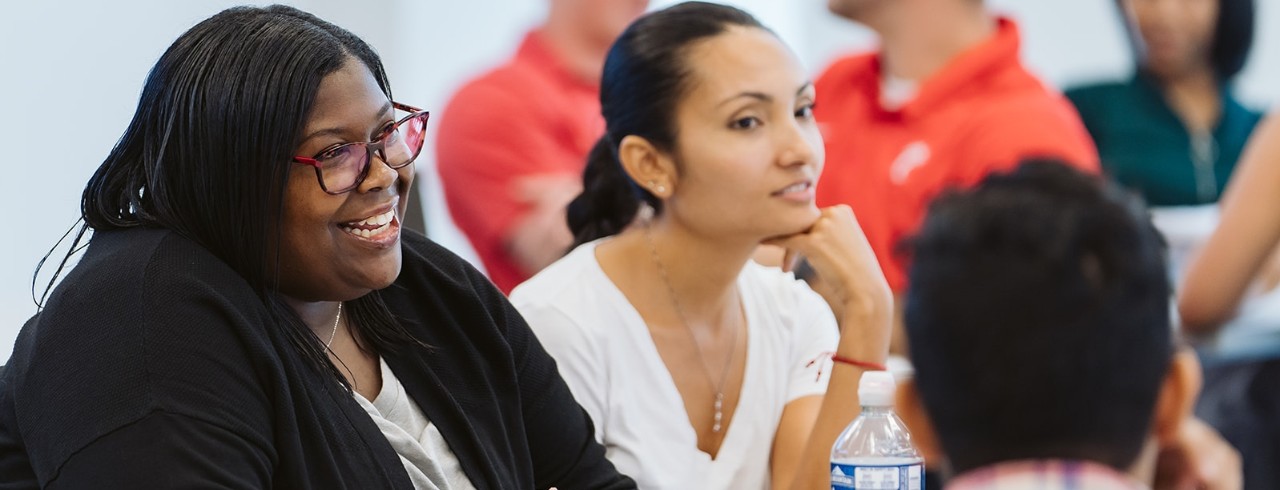
Lindner offers multiple MBA modalities to accommodate a diverse array of professionals
Full-time, part-time and online options offer flexibility, accessibility.

Emerging and growing professionals have multiple pathways toward earning a Master of Business Administration at the Carl H. Lindner College of Business. By assessing their needs, time commitments and career goals, professionals at all levels can choose from a full-time cohort learning experience, a working professionals part-time degree program or an online MBA option.
An MBA is an ideal addition to the resume of a professional seeking to advance in management positions and become a more effective leader. With a diverse array of learning outcomes related to all primary business functions, professionals in any field or discipline can benefit from obtaining an advanced business degree.
“It's a degree to help individuals become better managers. This is for teachers who want to become principals. Nurses who want to become department heads. Doctors who want to start their own practice or have a unit within hospital. Engineers who want to move from technical fields to the business realm,” said Johnny Rungtusanatham , PhD, academic director for Lindner MBA programs and professor of operations, business analytics, and information systems . “For students who have a business degree, they want to come back for an MBA, and they want to pivot.”
While all professionals may benefit from an MBA degree, their individual needs and situations will inform what modality is right for them. Prospective MBA students should reflect on their lifestyles and current commitments to make that decision. Lindner’s three MBA programs offer varying degrees of flexibility and time commitments to meet the needs of many individuals.
No matter the modality, Lindner’s MBA programs are top-tier and nationally ranked .
- No. 2 among Ohio public institutions ( Bloomberg Businessweek , Poets&Quants )
- No. 68 overall in the country ( Bloomberg Businessweek )
Part-time working professionals
- No. 1 among Ohio public institutions ( Fortune )
No. 26 in the country ( Fortune )
- No. 1 public online MBA program in Ohio ( U.S. News & World Report )
- No. 15 online MBA program in the country ( Fortune )
Full-time, cohort MBA program
The full-time, cohort MBA program allows individuals to form close connections with their fellow students as they progress through their degree program. Designed as a one-year program, the full-time MBA option is ideal for those willing to temporarily step away from their career to dedicate time to their professional development. Although heavily structured, the program offers some flexibility for students in terms of the electives they choose to complement their coursework. Note, admission to the full-time program is only offered for the fall semester.
Vidita Kanniks, ’24
Vidita Kanniks. Image provided.
Where are you from?
What was your most recent title?
Professional musician and educator
What drew you to Lindner?
Being a Lindner grad comes with a rich alumni network that I consider very valuable. I have a number of friends who are alumni of the college and have spoken highly of their experiences. I also honestly just love the new building design, and it felt like the icing on the cake. It's an inspiring space with world-class facilities.
Why did you choose to pursue an MBA?
I started working in the social media/marketing space within the classical music world and became curious about different career avenues in business. I felt an MBA would be the perfect curriculum to get a holistic understanding for business along with some hard skills and exposure to real-world experience.
What made the full-time, cohort program right for you?
The cohort program was a no-brainer. Especially after the COVID era, I was eager to be in a collaborative education environment. I really appreciate the continuity in the full-time program and the opportunities for teamwork and growth alongside my peers, similarly to colleagues in a work setting.
How do you anticipate earning an MBA will advance your career and/or professional goals?
I can already speak to the fact that the MBA has massively widened my perspective on the world and has equipped me with the vocabulary to better thrive in a business environment. I think the networking opportunities are equally valuable as the academic enrichment and I'm sure the faculty, student and alumni connections will serve me for a lifetime.
Part-time working professionals MBA program
Those wishing to enter the working professionals part-time MBA program benefit from the same socialization opportunities as the full-time, cohort program while enjoying more flexibility as to how and when they complete their degree requirements. Part-time MBA students may choose to take evening or weekend classes to accommodate their nine-to-five.
James Lenihan, ’22
James Lenihan. Image provided.
What is your current title?
Senior manager, project delivery, Fidelity Investments
What drew you to Lindner?
The location, value and reputation it carries among the professional community.
Why did you choose to pursue an MBA?
I weighed several reasons:
- As a way to satisfy my desire for continuous improvement.
- As a veteran, I had remaining GI Bill benefits that I wanted to use.
- I wanted to have an MBA as an additional “tool” in my toolbox as it may open doors and opportunities that otherwise might not be available.
- As a leader, I feel it's my obligation and responsibility to perfect my craft so that I can, in turn, channel the best work product out of my teams.
- Lastly, I have three children at home, and pursuing an MBA allows me to live by example that your education is never finished no matter how old you are.
What made the part-time modality right for you?
I work full-time and travel internationally, so the part-time option was best for me. And did I mention we had three kids?
I hope the MBA will open doors and opportunities for me that otherwise may not have been available. Additionally, the networking opportunities among other students, professors and staff has been a wonderful value add!
Online MBA program
The online MBA program offers the greatest degree of flexibility. Students decide when, where and how they complete their coursework. With all classes taken virtually, this degree option meets the needs of those who wish to earn a degree at their own pace in an accessible format.
Jeremy Martin, ’21
Jeremy Martin. Image provided.
I'm originally from Erie, Pennsylvania, but I have been living in Cincinnati since 2004.
Director of digital and user experience, University of Cincinnati
What drew you to Lindner?
As a longtime UC employee, I had been contemplating a graduate degree. The ranking and prestige of the Lindner MBA are what drew me to the college as I decided on a graduate pathway.
Why did you choose to pursue an MBA?
The MBA was the best fit for me in my professional progression. I did not have a lot of traditional business education or training, but as my career progressed, I was adding more and more management and oversight responsibilities to my role. I felt that the MBA was the most well-rounded business offering to provide me with the research and educational background to go along with my boots-on-the-ground experience.
What made the online modality right for you?
I have a full-time job, a family, hobbies and volunteer work that occupies much of my time. The flexibility to attend to coursework asynchronously and mold the program around my busy life was really important to me. I was able to connect with faculty members regularly without issue and even group projects were accessible through Zoom and Teams. Simply put, without the online option, I would not have been as successful in the program.
How has earning an MBA helped you to advance your career and/or achieve your professional goals?
The MBA has helped me to better understand the underlying business practices within my division, the university as a whole and external partners and vendors with which we interface. I’ve directly used learnings and coursework from my MBA program in personnel management practices, project planning, organization and communication, and financial management. An MBA provides students with real-world skills that fit in any professional environment. The Lindner MBA provided me with direct practices that I was able to integrate into my day-to-day and make me a better employee, co-worker and manager.
Featured Image at top: Full-time MBA students engage in a lively discussion on the first day of fall semester classes. Photo/Lauren Meisberger.
Earn your MBA at Lindner
Want to build your professional skills and develop your talents in a way that will open the right doors for you? Lindner's MBA program is small, personalized, customized and immersive. Our full-time, part-time working professionals and online programs have all gained national acclaim. Request more information or join us at a future information session .
- Online Learning
- Lindner College of Business
- Departments
- Graduate-Programs
- Graduate School
Related Stories
May 14, 2024
Poets and Quants: Lindner online MBA student recognized
June 23, 2022
University of Cincinnati student Amanda Cardoso Moyeno was recognized by Poets & Quants as a “2022 Best & Brightest Online MBA” honoree.
Poets & Quants: Lindner student receives online MBA honor
June 21, 2022
Trey Quealy, MBA ’23, has been named by Poets & Quants as a 2022 Best & Brightest Online MBA honoree.

The Experience
- Career Impact
- Inclusion and Belonging
- Global Opportunities
More about Kellogg
- History & Legacy
- Convocation Ceremony
Degree Programs
- Full-Time MBA
- Executive MBA
- Master in Management
- Evening & Weekend MBA
- Certificate Program for Undergraduates
- Which Program is Right for Me?
- Academic Calendars
Executive Education
- Online Programs
- Programs for Individuals
- Nonprofit Programs
- Programs for Groups
- The Kellogg Advantage
- Contact Executive Education
- Request a Brochure
- Find a Program
- Alumni Network
- Career Journeys
- Global Impact
- Student Stories
- Applying to Kellogg
Publications and blogs
- Kellogg Magazine
- Kellogg Insight
- See All News + Stories
Academics + Research
- Faculty Directory
- Research Centers
- Case Studies
- Faculty Teaching Awards
- Academic Departments
- Research + Books
- Faculty Recruiting
Academic expertise
- Data Analytics
- Family Business
- Leadership & Organizations
- Social Impact
- Entrepreneurship
- Full-Time MBA Admissions
- Evening & Weekend MBA Admissions
- Executive MBA Admissions
Additional resources
- Master in Management Admissions
- PhD / Doctoral Admissions
- Undergraduate Certificate Admissions
- Admissions Events
- Financial Aid Office
- Log into my account portal
- Companies + Recruiters
Pursuing a finance career? Use your past experiences as a springboard.
- Finance and Accounting

Welcome to the latest installment of our new series, “The Industry Ahead,” in which our faculty share the latest trends in hiring across a variety of career fields. This time we’re exploring the wide world of finance with clinical professor Jose Liberti, who teaches MBA courses at Kellogg and has extensive experience with financial services businesses.
“When students tell me they’re thinking about finance,” Professor Liberti says, “I ask them two questions: where are you coming from and where do you want to go?”
Liberti is the right person to ask. Before becoming a professor, he worked as a financial advisor for Citibank, and now consults with a range of financial services businesses including private equity firms, financial advisory services and others including involvement with Point 72 Academy, an investment analyst training program.
He uses his experience and insights to help students and others interested in finance careers aim for rewarding paths that make use of their past experience, whatever it may be.
Diverse paths and destinations
Liberti sees a lot of diversity among students interested in finance. “It might be that they have a background in finance itself,” he says. “Or something quantitative like engineering, or a mix of finance and consulting. It helps to know what they are building on.”
While quantitative experience makes for a strong finance foundation, Kellogg students from all backgrounds successfully pursue and land finance jobs, including those with military, teaching, or nonprofit experience.
No matter their background, students interested in finance must think about the industry and role that suits them best. “What are students attracted to?” Liberti says. “It used to be mostly about pursuing banking in New York City. But interests have become much more divergent in the last 10 to 15 years. "The past hyper-focus on pursuing high-salary jobs within the industry has diversified, and people are more interested in finding the right fit.”
That’s evident in the wide range of targets for Kellogg students pursuing finance, as Liberti notes: “It might be corporate finance like M&A inside Boeing or Cisco. Or middle-market private equity. Or working with owners of a family enterprise to make investments after they sell their business.” Some students even learn how to raise funds to purchase and run a single business, including managing all finance activities.

A strategic, specialized field
Liberti sees finance as an increasingly strategic, specialized field.
“Some people are surprised by how strategic finance is,” he says. “In the first year of the MBA program, students begin to understand how much logic there is to it and become interested in learning more about what makes it work.”
What makes it work, these days, seems to be specialization. “Demand is increasing for finance specialists,” Liberti says.
The good news is that most people pursuing finance can use their past to shape their future professional role, including specialization. “It’s about levering up what you’ve already done,” Liberti says. “If you were an oil-and-gas engineer or worked in the music industry, for example, you can come to Kellogg and dial your focus on corporate finance, which would allow you become a very hot commodity working for a private equity firm that invests in oil or the music industry.” In a similar way, students with past roles focused on climate, policy or sustainability can focus on impact investing at Kellogg to shape their post-MBA career.
Finance is a popular destination for Kellogg students, and incoming MBA students wanting to switch into this industry can start their learning journey even before they arrive on campus. The Career Management Center offers a wealth of programming and resources, including a summer alumni panel just for the finance industry, interviewing and an in-depth career training via the Launchpad pre-MBA course.
“Don’t kill your past,” Liberti advises. “Use your expertise to increase your finance job prospects.”

The Kellogg advantage
Kellogg enables anyone pursuing finance to gain key skills and career opportunities. Among key finance-related offerings are:
- A dedicated finance major. Kellogg offers many majors and pathways in its MBA programs. The finance major is tailored for students wanting a fundamental knowledge base and practical tools that are essential for careers in the field. Students combine these classes with other essential coursework in data analytics and negotiations to create a powerful foundation for finance careers.
- Specialized finance pathways that let students go deeper into specific topic areas, including venture capital and private equity , asset management , and growth and scaling .
- Experiential learning opportunities offering hands-on experience outside the classroom. Kellogg offers a wide variety of experiential courses in many subject areas, including finance. Lab courses in PE, VC and asset management immerse students in a client project with a real company, and the annual PE/VC Conference .
- Student-led clubs that bring together peers interested in finance careers and connect them with companies and alumni. Groups at Kellogg include the Investment Banking and Capital Markets Club, Corporate Finance Club, Fintech club, Private Equity Club, Investment Management Club and many others.
- Case competitions, which let students take their hands-on experiences in finance even further by working with a team of classmates to solve a challenge. Kellogg teams participate in and win top competitions, and a Kellogg group took first place this year in the Venture Capital Investment Competition (VCIC), the world’s top VC competition for MBAs.
- A deep and broad alumni network that invests in you . Many Kellogg alumni work in finance roles, with the highest concentrations in Chicago, New York, San Francisco and Los Angeles. Of those, a large segment work in private equity or venture capital.
- Career guidance tailored for you. The Career Management Center offers unlimited one-on-one coaching to students, a dedicated research specialist to help you chart your professional path, and resources that extend even after graduation. For students particularly interested in careers in finance, clubs and the CMC offer workshops and learning tools just for finance interviewing. Students can also go on company treks to firms in PE, VC and investment banking.
Read next
Curious about what an MBA in finance at Kellogg can do for you? Follow the links here to read about students and alumni in finance and discover the latest research from our finance faculty . Or, explore our degree programs to find the right fit for you.

by Ryan Fagan | May 20, 2024
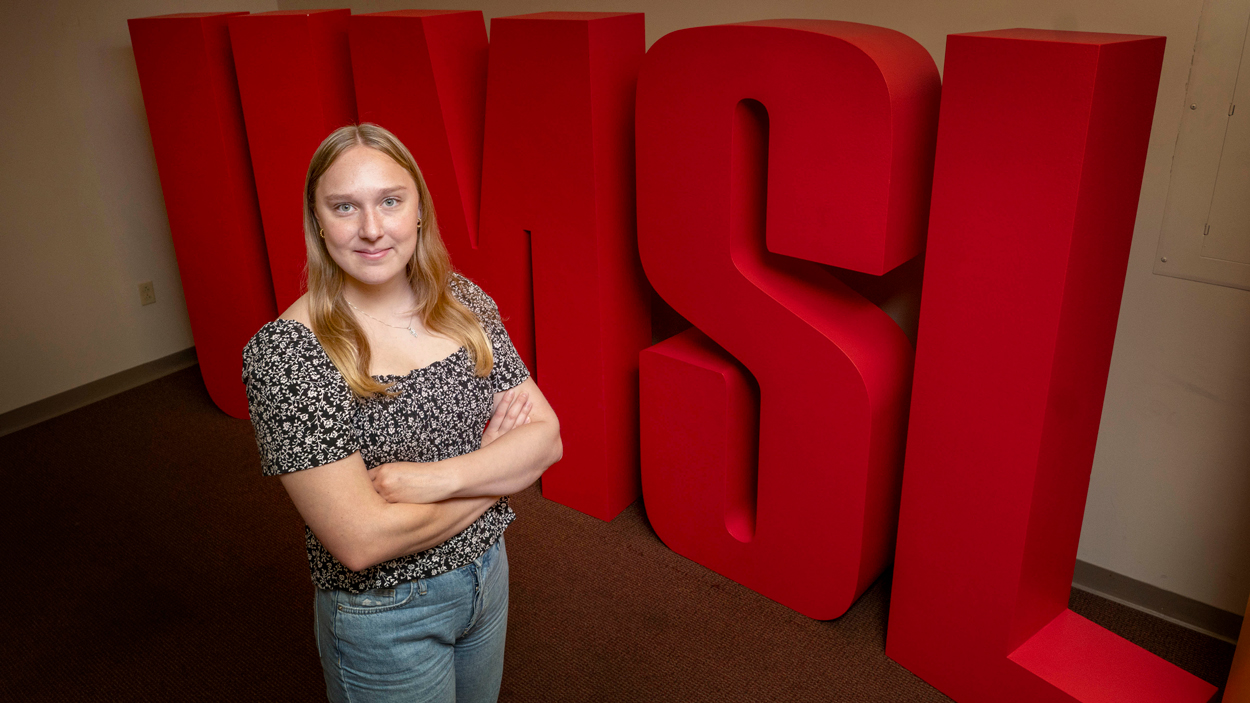
Rebecca Bechtel graduated in May with her MBA. (Photo by Derik Holtmann)
Rebecca Bechtel is no stranger to new beginnings and dramatic life changes.
When she came to the University of Missouri–St. Louis to join the women’s swimming team as a freshman, after all, she was moving across the globe, from Cologne, Germany. She went from speaking English one hour a day at school to speaking English all day, every day.
Bechtel didn’t just survive her new reality, she thrived.
“She was part of my second class that I recruited here at UMSL,” Tritons Head Coach Tony Hernandez said. “She was a huge piece of how we wanted to build our program, with the priorities she has, the discipline she has. She has been a model type of teammate we’re looking for, as an athlete but also such a dedicated student.”
This past weekend, Bechtel graduated with her MBA , with an emphasis in marketing, as part of UMSL’s Accelerated Master’s program . In February, she competed in her final events with the UMSL women’s swimming team, at the GLVC championships . In July, after a trip back to Germany to visit with family, she’ll start her new career, as a tax consultant for Deloitte in St. Louis . It’s a series of potentially daunting adjustments, no doubt, but the way she’s approaching this life modification isn’t at all surprising to those who know her best.
She is hitting the ground running, both literally and figuratively, for this new stage in her life.
“I started swimming when I was 9 years old, so it’s been a part of my life for a long, long time,” Bechtel said. “Not swimming for the first time now, it’s kind of exciting, but also sad. I’m starting my life – new sports, trying new things. I just ran a half marathon last weekend. I’m starting new workouts and trying new things.”
With an eight-week training program under her belt, Bechtel ran the Go! St. Louis half-marathon on April 27 . Running, obviously, requires a different group of muscles than swimming. But at the basic level, after years of distance freestyle swimming, the endurance was no problem.
Her next step, with Deloitte, is similar. Her MBA emphasis was in marketing, but her new job is as a tax consultant – as was her summer internship at KPMG, back home in Cologne . At the basic level, though, it’s her understanding of fundamental business principles and love of numbers that allows her to flourish in both disciplines.
“I actually was interested in finance and accounting all along, and I was going get my master’s in that area,” she said. “But then I got offered the GA position with Perry Drake in marketing, and I like marketing, too. I just think I’m better with numbers. I like doing math. I like doing accounting. All my finance classes have been fun, so I thought I’d rather work in that field.”
Drake gives his graduate assistants a very hands-on role. Bechtel, who held the GA role from January 2023 through graduation, helped manage the marketing club, and she was instrumental in helping with the lead-up to the Midwest Digital Marketing Conference – which was held this week at the Blanche M. Touhill Performing Arts Center – including preparing the programs.
“She’s great,” Drake said. “I can’t say enough good things about Rebecca.”
Every year, Drake teaches a course at the University of Applied Sciences in Seinäjoki, Finland , and this past November, he gave Bechtel the opportunity to be his teaching assistant for the class. It was an unforgettable trip.
“We taught a three-day class,” Bechtel said. “We taught all day, every day. We got to experience some of the city of Seinäjoki. It’s in Finland, so it was snowy and cold. It was a really cool experience, getting to see what it’s like to go abroad to teach and getting to see their university.”
Bechtel prepared and taught the section on using Tik Tok as a marketing tool, but the classroom wasn’t her only responsibility. Remember, she was still an UMSL swimmer.
“I sent her workouts, and she found a pool, she found a gym, she did all the workouts she needed,” Hernandez said. “That just speaks to her discipline.”
Bechtel qualified for the GLVC conference finals all five of her seasons swimming for UMSL. At her final conference event, in February , she finished 10th of 36 swimmers in the 1,000-yard freestyle and 13th of 29 in the 1,650-yard freestyle. She also competed with a pair of UMSL relay teams, too. Her brother, Hendrik, just finished his freshman season at UMSL . At the GLVC meet, he was part of the UMSL squad that finished fifth in the 800-yard freestyle relay.
Bechtel connected with UMSL early in the process of choosing a college. The Scholarbook agency helped her explore options, gathering pertinent data – GPA, swimming times, etc. – and preparing highlight clips that were sent to coaches in the United States.
Hernandez was immediately impressed by Bechtel’s grades and interest in pursuing a business degree – he knew UMSL’s strong College of Business Administration would help in the recruiting process – and just as importantly, in the pool. “Times don’t lie,” he said. Hernandez needed someone who could compete in a very competitive conference, so he wasted no time connecting.
“Tony, my coach, he’s actually the one that reached out to me first,” Bechtel said. “I talked to some other schools, but I always kept coming back to UMSL.”
It just so happened that Hernandez and his wife had a trip planned to Europe, including a stop in Cologne, so he got to meet Bechtel and her family on what wound up being an unofficial recruiting trip. That meeting helped Bechtel make the decision to choose UMSL. And being part of Hernandez’s team helped make the transition to the U.S. smoother.
“Right from the first day, I had my team, all people who were here to swim, a bunch of new people that came in with me as a freshman,” Bechtel said. “They’re right there with you from the first day on, and you see them twice a day every day. We live together, so it’s an immediate friend group, an immediate family that is there to support you. That definitely helped a lot. I cannot imagine coming here knowing nobody and just being by myself. That was a big part getting settled so fast, getting integrated and enjoying being here.”
And the discipline of being an athlete, of understanding the importance of staying consistent with her training, Bechtel said, that has helped her juggle all of her UMSL responsibilities.
“I would spend 20 hours a week in the pool and go to school and do all my homework and work as well,” she said. “You need to be on top of everything. I start my day swimming, then I go to class, then I do my homework, then I work in between and then I go back to swimming. You need to know when you’re doing what and stay on top of your deadlines otherwise you’re just not gonna get it done. As athletes, we’re driven to work toward something because that’s part of the sport. You want to be the best you can be, so I think that also translates into the classroom. Every time I take a test, I want to get an A. I think that’s just the ambition, the competitiveness, working hard to get what you want.”
And it’s that ambition, that competitiveness, the innate desire to work hard to get what she wants, that will help make her career as much of a success as her time at UMSL. She enjoyed her college experience so much that she wanted to stay after finishing her MBA.
“I have my life here now,” Bechtel said. “I’ve been here for five years and my friends, they’re almost family to me now. And I really like St. Louis. So if I was going to stay in the U.S., I want to stay close. I was only looking at cities within driving distance of St. Louis. I was also looking in Germany, because my family is far away, and I do want to be closer to them again. But for now, since all of my life is here now, I just decided to stay.”

LATEST NEWS

YOU MIGHT ALSO LIKE
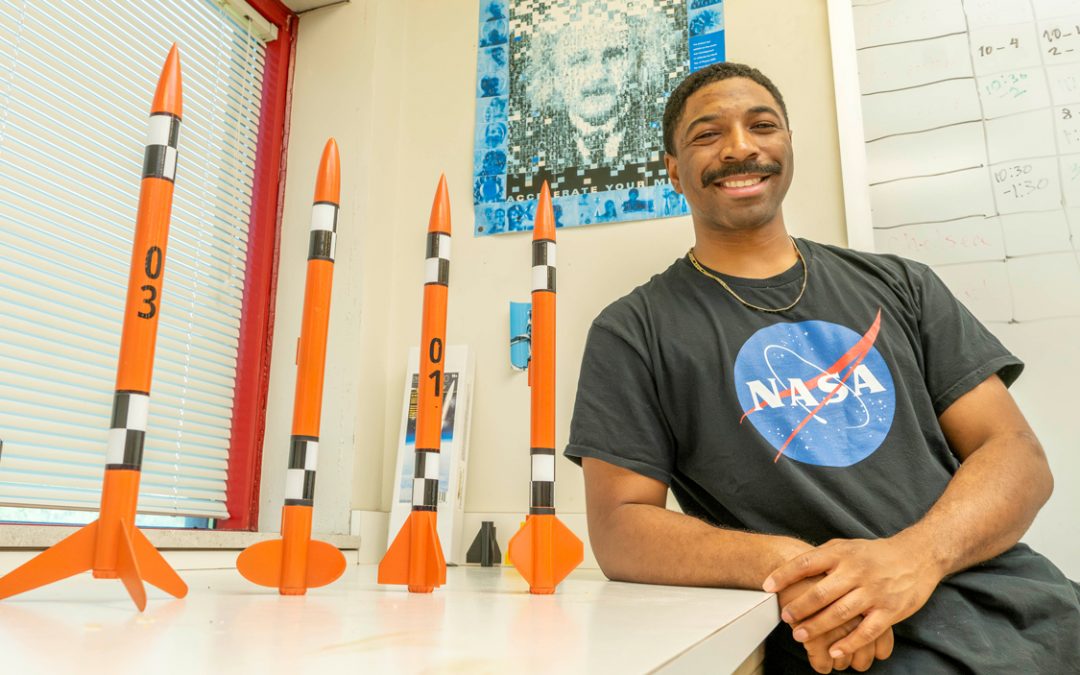
Physics graduate Keith Reece finds personal, professional growth conducting comet research
Reece has assisted Professor Erika Gibb and Assistant Professor Mohi Saki with research utilizing the NASA Infrared Telescope Facility.
May 20, 2024

Eye on UMSL: Building blocks
Members of the Spring 2024 graduating class of the University of Missouri–St. Louis play Jenga during the annual New Grad Bash on Thursday.
Retiring Dean Ann Taylor has left lasting mark on College of Education
The college has continued its strong reputation for teacher preparation while expanding its research activity and adding new programs during Taylor’s eight years as dean.
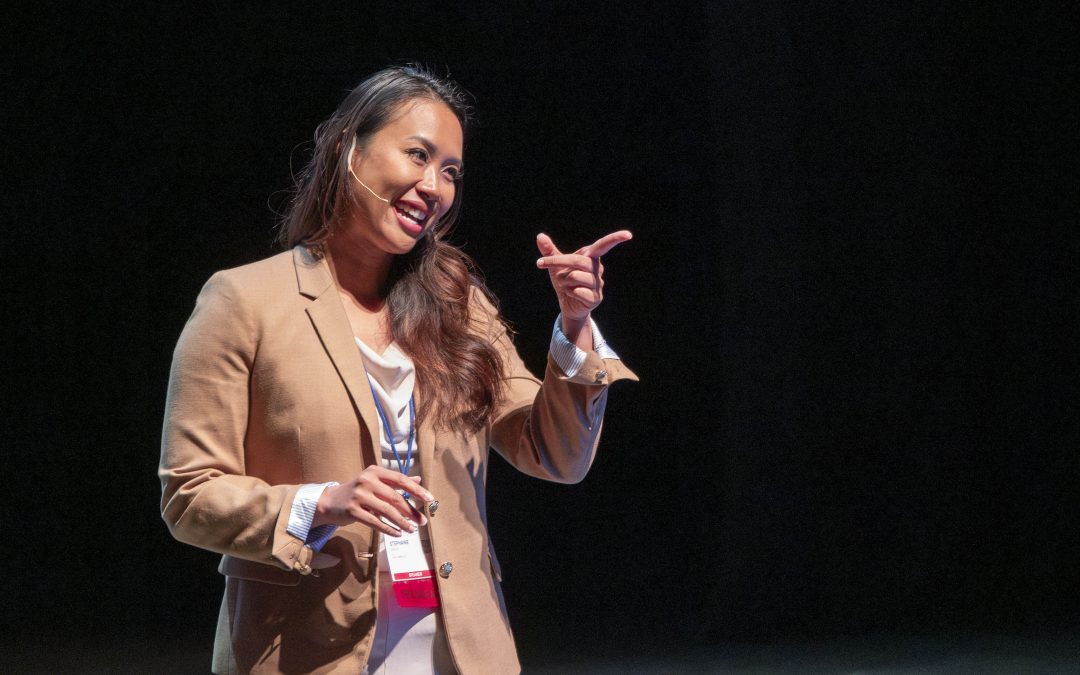
Midwest Digital Marketing Conference continues to build post-pandemic momentum with three-day event on UMSL’s campus
The 12th annual MDMC featured more than 75 presenters and speakers, spread over 40 sessions, to educate and entertain 575 attendees at this year’s event

COMMENTS
An MBA, or Master of Business Administration, is a specialized graduate-level degree in the field of business. The purpose of an MBA degree is to provide recipients with an extensive understanding of business-related topics. Those who pursue an MBA typically want to strengthen their qualifications to advance their career and pursue leadership ...
To answer the budding question: yes, you can pursue your PhD after earning your MBA, and choosing to earn a doctorate is entirely up to you and your aspirations. To help you better understand if getting a PhD is the right choice, we look at the path an MBA graduate can take to earn their PhD, one of the higher purposes of a doctorate, and the ...
The debate between MBA vs. PhD highlights the significant differences in their focus and career paths. While both degrees can be obtained at a business school, they cater to different ambitions and provide distinct opportunities. The choice between an MBA or a PhD depends on one's end goal, work experience, and personal preferences.
That is why the Stanford MBA Program empowers you to combine studies. This flexibility offers a rich and valuable academic experience. Generally, about 20 percent of Stanford MBA students take advantage of a joint or dual degree to complement their MBA. As a student, you may also take courses in any department or graduate school at Stanford ...
Offerings. An MBA may be pursued in combination with a PhD in one of a wide array of areas of study, in the biological sciences, engineering and applied sciences, the humanities, the physical sciences, and social sciences. An MBA/PhD is not available in the management disciplines.
Students in our PhD programs are encouraged from day one to think of this experience as their first job in business academia—a training ground for a challenging and rewarding career generating rigorous, relevant research that influences practice. Our doctoral students work with faculty and access resources throughout HBS and Harvard University.
MBA vs. PhD: Choose Your Advanced Degree Path. March 11, 2021. In 2021, it is practically conventional wisdom that an advanced degree like a master's degree, an MBA, a PhD, a JD or an MD is a necessity if you want to give yourself the best chance of a successful, meaningful career. While professional doctoral degrees like JDs and MDs will ...
The only management master's degree of its kind, the Cornell-Tsinghua Finance MBA is delivered in English and Chinese (Mandarin). Based in Beijing, this part-time international finance program accommodates even the most demanding schedules. Over the course of 22 months, you'll complete your MBA courses on the weekends, allowing you to ...
MBA is short for Master of Business Administration, while PhD is short for Doctor of Philosophy. Just from the first word of both types of degrees, we can already see that there's an obvious difference between the two, but let's proceed. In terms of the required time commitment, an MBA will usually take two years to complete full time.
Prior Degrees, Current Students. Some of the greatest intellectual challenges of our time are emerging from the broad fields of business management. Harvard Business School together with the Harvard Graduate School of Arts and Sciences offers PHD programs that reflect the changing world of business, society, and education.
But for students balancing their personal life and career on top of their coursework, a part-time MBA still requires dedication to finish. READ MORE. # 1. University of Chicago (Booth) Chicago, IL ...
5. MBA & Juris Doctor. One of the most versatile master's and doctorate combined programs, a combined MBA/JD covers both business management and law. This degree can prepare you for careers in corporate law or any other industry where business and law intersect. MBA/JD programs take 3-5 years to complete.
Key Takeaways. An MBA is well-suited for students who are interested in practical work experience, while PhD candidates focus on those interested in research primarily. If you thrive in practical business settings, seek rapid career advancement, and value hands-on experience, pursuing an MBA degree may be a good choice.
The two most common types of graduate degrees are master's and doctoral degrees: A master's is a 1-2 year degree that can prepare you for a multitude of careers. A PhD, or doctoral degree, takes 3-7 years to complete (depending on the country) and prepares you for a career in academic research. A master's is also the necessary first ...
As a PhD student at Stanford Graduate School of Business, you will be inspired and challenged to explore novel ideas and complex questions. Fall 2024 applications are now closed. Applications for Fall 2025 will be available in September 2024. ... Students in the MBA and PhD programs honored Rebecca Lester and Anne Beyer, respectively, for their ...
The PhD/MBA program is a synthesis of curricula from the Graduate School and the Evening MBA Program of the Schools of Business, with specialized course work and opportunities for industrial and business internships. The joint program is open to new and current students in all PhD-granting programs across all Wake Forest campuses.
A PhD-MBA or MBA-PhD is a dual degree program offered in some cases by schools of science, engineering or social science, jointly with business schools. The program generally lasts four to eight years and results in the candidate earning both a Doctor of Philosophy (PhD) degree and a Master of Business Administration (MBA) degree.
In collaboration with six Harvard University graduate schools, Harvard Business School offers seven Joint Degree programs. These programs prepare individuals for complex leadership challenges that balance expertise with effective management skills. All Joint Degree students are required to complete the MBA Required Curriculum in its entirety.
MIT Sloan PhD Program graduates lead in their fields and are teaching and producing research at the world's most prestigious universities. Rigorous, discipline-based research is the hallmark of the MIT Sloan PhD Program. The program is committed to educating scholars who will lead in their fields of research—those with outstanding ...
1. PhD = specialist in a subject, research skills, critical mind MBA = Broad generalist, management, problem solving. The focus and scope is not the same. Also like it was said most researchers who want to climb the ladder need to take the management track which often require an MBA. Put simply an MD is an MD but a hospital manager needs to be ...
The PhD/MBA joint degree program offers the unique opportunity for PhD students at Dartmouth College to finish off their training with management education. The joint degree aims to produce individuals who are not only thoroughly trained in a scientific discipline but also possess fundamental business and entrepreneurial skills. The program is ...
These three-year, dual-degree programs, offered by Wharton and the Harvard Kennedy School (HKS) prepare students to operate in both business and public policy or public administration fields. For students with an interest in crafting solutions for public problems across business, government, policy, and more, the dual degree MBA in public ...
A Master of Business Administration (MBA) is a graduate program in business and management that emphasizes leadership and managerial skills. In an MBA program, you'll learn fundamentals such as finance, marketing, and organizational behavior, while building skills in communication, leadership, and strategic thinking, among other areas.
The University of Southern Mississippi (USM) Master of Business Administration program (MBA) program has been ranked No. 31 nationally in the Best Online MBA programs for 2024 by Fortune Education. The current ranking represents a gain of 17 spots from its 2023 rankings. Housed in the College of ...
Experiencing the HBS / HKS Joint Degree Program. In collaboration with six Harvard University graduate schools, Harvard Business School has created seven joint degree programs designed to prepare individuals for complex leadership challenges that balance expertise with effective management skills.
Engineers who want to move from technical fields to the business realm," said Johnny Rungtusanatham, PhD, academic director for Lindner MBA programs and professor of operations, business analytics, and information systems. "For students who have a business degree, they want to come back for an MBA, and they want to pivot." ...
In a similar way, students with past roles focused on climate, policy or sustainability can focus on impact investing at Kellogg to shape their post-MBA career. Finance is a popular destination for Kellogg students, and incoming MBA students wanting to switch into this industry can start their learning journey even before they arrive on campus.
Sixty-eight MBA students from the Manning School's Abitus partnership in Japan traveled to Lowell for the hooding ceremony and Commencement. Assoc. Dean of Graduate Studies and Research Yi Yang noted that in her 18 years at the Manning School, the graduate program has grown from 250 students to more than 1,500.
Drake gives his graduate assistants a very hands-on role. Bechtel, who held the GA role from January 2023 through graduation, helped manage the marketing club, and she was instrumental in helping with the lead-up to the Midwest Digital Marketing Conference - which was held this week at the Blanche M. Touhill Performing Arts Center ...
Student Spotlight: Adam Grant (Walton Executive MBA '24) Adam Grant is a sales account manager at Butterball, LLC and a member of the 2024 Walton Executive MBA cohort. In his role, Adam provides support to Walmart and Sam's Club accounts through sales insights and solutions, works closely with customer merchants, and aids in the development and execution of sales plans that deliver volume ...